反义疑问句练习题(附答案)教学内容
反义疑问句详细讲解及习题及答案

反义疑问句一.句型解释反义疑问句(The Disjunctive Question):即附加疑问句。
它表示提问人的看法,没有把握,需要对方证实。
反义疑问句由两部分组成:前一部分是一个陈述句,后一部分是一个简短的疑问句,两部分的人称时态应保持一致。
1.陈述部分肯定式+疑问部分否定式2.陈述部分否定式+疑问部分肯定式She was ill yesterday, wasn’t she?You didn’t go, did you?二.特殊的句型1.祈使句。
祈使句后一般加上will you或won't you构成反意疑问句,用will you 多表示“请求”,用won't you 多表示提醒对方注意。
例如:Let引导的祈使句有两种情况:1) Let's...,后的反意疑问句用shall we或shan't we。
例如:Let's go home, shall we/ shan't we? 回家吧,好吗?2)Let us/me...后的反意疑问句用will you或won't you。
例如:Let me have a try, will you/won't you?3)祈使句都用will you 或won’t you2.当陈述部分含I think (believe, suppose...)that... 结构时,其反意疑问句须与从句的主、谓语保持一致,注意主句的主语必须是第一人称。
例如:I don't think he will come, will he?若是非第一人称,则与主句的主语相一致He thinks that she will come, doesn’t he?反意疑问句的陈述部分为I(We) don’t think(believe, suppose, consider)+ that从句时,从句为否定意义,问句部分的动词和主语仍与that从句保持一致且用肯定式。
六年级英语反义疑问句练习题30题(带答案)
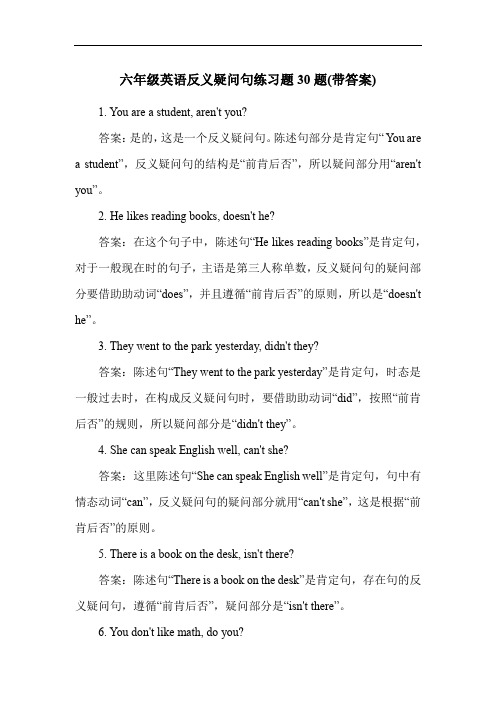
六年级英语反义疑问句练习题30题(带答案)1. You are a student, aren't you?答案:是的,这是一个反义疑问句。
陈述句部分是肯定句“ You are a student”,反义疑问句的结构是“前肯后否”,所以疑问部分用“aren't you”。
2. He likes reading books, doesn't he?答案:在这个句子中,陈述句“He likes reading books”是肯定句,对于一般现在时的句子,主语是第三人称单数,反义疑问句的疑问部分要借助助动词“does”,并且遵循“前肯后否”的原则,所以是“doesn't he”。
3. They went to the park yesterday, didn't they?答案:陈述句“They went to the park yesterday”是肯定句,时态是一般过去时,在构成反义疑问句时,要借助助动词“did”,按照“前肯后否”的规则,所以疑问部分是“didn't they”。
4. She can speak English well, can't she?答案:这里陈述句“She can speak English well”是肯定句,句中有情态动词“can”,反义疑问句的疑问部分就用“can't she”,这是根据“前肯后否”的原则。
5. There is a book on the desk, isn't there?答案:陈述句“There is a book on the desk”是肯定句,存在句的反义疑问句,遵循“前肯后否”,疑问部分是“isn't there”。
6. You don't like math, do you?答案:陈述句“You don't like math”是否定句,反义疑问句的结构是“前否后肯”,所以疑问部分是“do you”。
(完整word版)反义疑问句练习题(附答案).doc
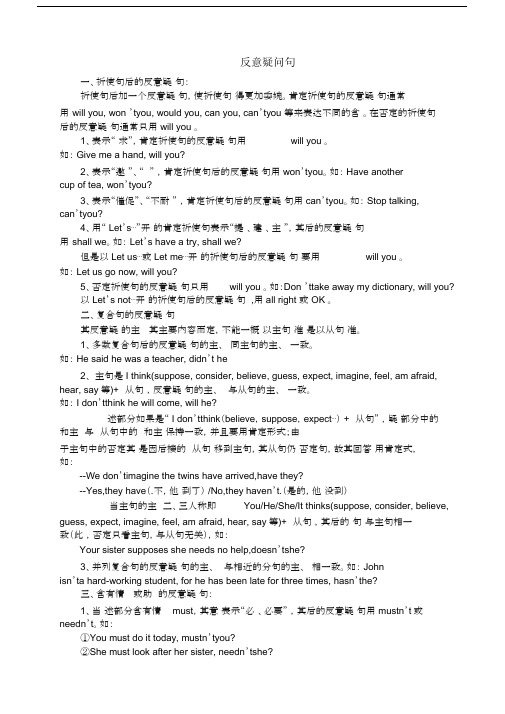
反意疑问句一、祈使句后的反意疑句:祈使句后加一个反意疑句,使祈使句得更加委婉。
肯定祈使句的反意疑句通常用will you, won ’tyou, would you, can you, can’tyou 等来表达不同的含。
在否定的祈使句后的反意疑句通常只用 will you 。
1、表示“ 求”,肯定祈使句的反意疑句用will you 。
如: Give me a hand, will you?2、表示“邀”、“ ” ,肯定祈使句后的反意疑句用 won’tyou。
如: Have anothercup of tea, won’tyou?3、表示“催促”、“不耐” ,肯定祈使句后的反意疑句用 can’tyou。
如: Stop talking,can’tyou?4、用“ Let’s⋯”开的肯定祈使句表示“提、建、主”,其后的反意疑句用shall we。
如: Let’s have a try, shall we?但是以 Let us⋯或 Let me⋯开的祈使句后的反意疑句要用will you 。
如: Let us go now, will you?5、否定祈使句的反意疑句只用will you 。
如:Don ’ttake away my dictionary, will you?以Let’s not⋯开的祈使句后的反意疑句 ,用 all right 或 OK 。
二、复合句的反意疑句其反意疑的主其主要内容而定,不能一概以主句准是以从句准。
1、多数复合句后的反意疑句的主、同主句的主、一致。
如: He said he was a teacher, didn’t he2、主句是 I think(suppose, consider, believe, guess, expect, imagine, feel, am afraid, hear, say等)+从句,反意疑句的主、与从句的主、一致。
如: I don’tthink he will come, will he?述部分如果是“ I don’tthink(believe,suppose,expect⋯) +从句” ,疑部分中的和主与从句中的和主保持一致,并且要用肯定形式;由于主句中的否定其是因后接的从句移到主句,其从句仍否定句,故其回答用肯定式,如:--We don’timagine the twins have arrived,have they?--Yes,they have(.不,他到了) /No,they haven’t.(是的,他没到)当主句的主二、三人称即You/He/She/It thinks(suppose, consider, believe, guess, expect, imagine, feel, am afraid, hear, say等)+从句,其后的句与主句相一致(此,否定只看主句,与从句无关),如:Your sister supposes she needs no help,doesn’tshe?3、并列复合句的反意疑句的主、与相近的分句的主、相一致。
(完整版)初中英语反义疑问句经典练习(含答案)(改)

反义疑问句练习题1.Lind.at.nothin.thi.morning.___.......A.didn’.sh. B.wa.sh. C.di.sh. D.wasn’.sh.2.There’.hardly__.mil.i.th.bottle._____there..A.no.isn’..B.some.i..C.little.isn’..D.any.i.3.H.ha.neve.ridde..hors.before.___..... A.doe.h..B.ha.h..C.hasn’.h..D.doesn’.h.4..H.seldo.cam.here._____...Ye.sir.. A.didn’.h..B.doe.h..C.doesn’.h..D.di.h.5.Everythin.seem.al.right.____........ A.doe.i..B.don’.the..C.won’.i..D.doesn’.i.7.On.can’.b.to.modest.ca.____....... A.on..B.h..C.i..D.w.8.N.on.faile.i.th.exam.____........ A.wa.h..B.di.on..C.di.the..D.didn’.h.11.H.can’.b.he.father.____.he........A.i..B.isn’..C.ca..D.can’.12.The.hav.n.tim.t.visi.th.museum._____..A.d.the..B.haven’.the..C.don’.the..D.wil.the.18.H.dislike.th.tw.subjects.____.he.....A.doe..B.doesn’..C.i..D.isn’.eles.now.____.......A.ar.the..B.aren’.the..C.i.i..D.isn’.i.23.Let’.g.ther.b.bus.___..........A.wil.yo..B.shal.w..C.don’.yo..D.wil.yo.24.Le.u.g.t.pla.football.___........ A.wil.yo..B.shal.w..C.d.w..D.ar.w.25.Don’.forge.t.giv.Poll.som.foo.an.chang.he.water._.A.wil.yo..B.shal.w..C.won’.yo..D.d.yo.26..Let’.g.shoppin.thi.afternoon._____.. .Al.right.A.wil.w..B.shal.w..C.don’.w..D.ar.w.27..Pas.m.th.dictionary._____...Yes.wit.pleasure.A.woul.yo..B.wil.yo..C.won’.yo..D.wouldn’.yo.30.Ther.i.littl.wate.i.th.glass.____.A.isn’.ther..B.isn’.i..C.i.i..D.i.ther.32.Ther.won’.b.an.concer.thi.Saturda.evening.____..A.wil.ther.no..B.wil.ther..C.i.ther..D.won’.33...gues.sh.taugh.hersel.Japanese.______.. .Yes. A.don’...B.di.sh..C.d...D.didn’.sh.34..don’.believ.yo.ar.right.____...........A.ar.yo..B.d.yo..C.won’.yo..D.d.35.Sh.doesn’.thin.tha.To.sing.bes.i.th.class.____..A.doe.sh..B.doesn’.sh..C.doe.h..D.doesn’.h.37..kno.yo.didn’.wan.t.hur.me.____........A.di.yo..B.didn’.yo..C.d...D.don’..38.I.m.fathe.wer.her.h.woul.b.ver.happy.____..A.weren’.h..B.wer.h..C.wouldn’.h..D.woul.h.1.It’.ver.ho.today, _______________ ........2. H.ca.spea.Chinese, _______________ ?3. Meime.studie.i..middl.school, _______________ .t., _______________ ?5.Don’t go ou.a.night, _______________ .......6.H.neve.love.col.weathe., _______________ ?7.Yo.finishe.th.tas.yesterday, _______________ ...9.To.ha.bee.t.Singapor., _______________ ?10.Th.story i.littl.interesting, _______________ ?11.Everythin.start.t.gro.i.spring, _______________ . 12.H.ca.hardl.finis.hi.homework, _______________ ?13.I’.i.Clas.3,Grad.2, _______________ ........14.Let’.g.shoppin., _______________ ?15.Sh.doesn’.lik.climbin.hill., _______________ .... 16..don’.thin.i.i.col.today, _______________ ?17.Yo.thin.h.i..goo.fligh.attendant,. _______________ .18.Nobod.know.wher.sh.lives, _______________ ?19.Fe.student.ca.answe.th.question, _______________ ..20.Mik.like.English. _______________ ?21.That was a wonderful night, _______________ ? 22.Your sister helped him, _______________ ?23.Tom is skating, _______________ ?24.You aren’t a teacher, _______________ ?25.They haven’t been to the Great Wall, _______________ ? 26.You will join the soccer team, _______________ ?27.He likes neither apples nor pears, _______________ ? 28.There are some good books for you, _______________ ?29.They have been there twice, _______________ ? 30.Let’s do it now, _______________ ?31.You dislike this kind of gifts, _______________ ? 32.Nothing is impossible, _______________ ?33.Everything is possible, _______________ ? 34.He doesn’t go to school by bus, _______________ ?35.There is little milk left in the bottle, _______________ ?36.Let us clean the classroom by ourselves, _______________ ?37.He has studied here for about four years, _______________ ?38.You have never lost money before, _______________ ?39.Few of them hurt themselves in the accident last night, _______________ ?40.Peter could hardly see the words on the blackboard, _______________ ?41.She’s American, _______________ ? 42.There will be a volleyball match in our school, _______________ ? 43.Don’t smoke in the reading-room, _______________ ? 44.I don’t think he is right, _______________ ?45.You must do your homework by yourself, _______________ ?46.You mustn’t touch the machine, _______________ ?47.He must be a worker, _______________ ? 48.Someone looked for me yesterday, _______________ ?49.I’m a teacher, _______________ ? 50.What a nice watch, _______________ ?51.I wish to use your ruler, _______________ ? 52.I have to stay at home, _______________ ?53.You’d better wear warm clothes today, _______________ ?54.What he needs is his parents’ love, _______________ ?55.You’d like a cup of tea, _______________ ? 56.Don’t be late again, _______________ ?57.Their prices are really low, _______________ ? 58.Reading is good for you to learn English, _______________ ? 59.No one knows about it, _______________ ? 60.I think you should study hard, _______________ ?Key: 1—5 CDBDD 6—10 BACDC 11—15 AABAB 16—20 CCBBA 21—25CDBAA 26—30 BBBAD 31—35 BBDAA 36—38 AAC附加答案:..isn’.it.. 2.can’.h.. 3.doesn’.she..4.doe.he... 5.wil.yo.6.does.he.7.didn’.you .8..isn’....9.hasn’.he...10.i.it11.doesn’t it 12.can he 13 .aren’t I 14.shall we 15.does she16.is it 17.don’t you18does it 19. can they 20.doesn’t he21.wasn’t it 22.didn’t she 23.isn’t he 24.are you 25.have they26.wont you 27.does he 28.aren’t there 29.haven’t they 30.shall we31.don’t you 32.is it 33.isn’t it 34.does he 35.is th ere36.will you 37.hasn’t he 38.have you 39.did they 40.could he41.isn’t she 42.won’t there 43.will you 44.is he 45.mustn’t you46.must you 47.isn’t he 48.didn’t they 49.aren’t I 50.isn’t it51.may I 52.don’t I 53.hadn’t you 54.isn’t it 55.wouldn’t you56.will you 57.aren’t they 58.isn’t it 59.do they 60.shouldn’t you。
完整版反义疑问句练习题和答案讲解
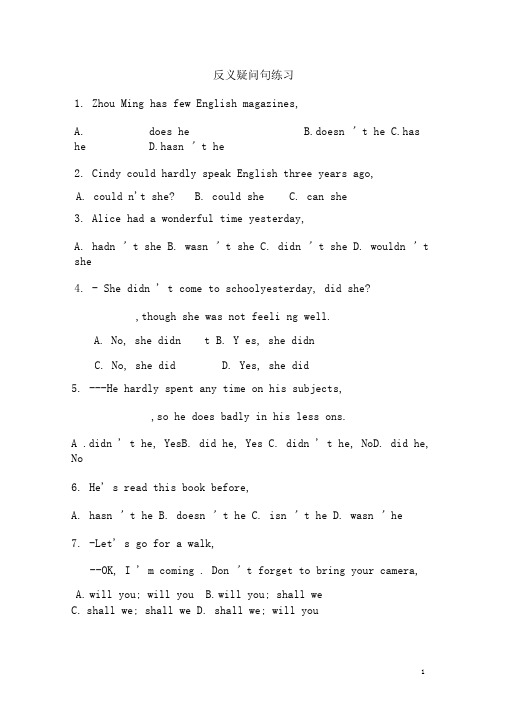
反义疑问句练习1.Zhou Ming has few English magazines,A.does heB.doesn ' t heC.has heD.hasn ' t he2.Cindy could hardly speak English three years ago,A. could n't she?B. could sheC. can she3.Alice had a wonderful time yesterday,A.hadn ' t sheB. wasn ' t sheC. didn ' t sheD. wouldn ' t she4.- She didn ' t come to schoolyesterday, did she?,though she was not feeli ng well.A. No, she didn tB. Y es, she didnC. No, she didD. Yes, she did5.---He hardly spent any time on his subjects,,so he does badly in his less ons.A .didn ' t he, YesB. did he, Yes C. didn ' t he, NoD. did he, No6.He' s read this book before,A.hasn ' t heB. doesn ' t heC. isn ' t heD. wasn ' he7.-Let' s go for a walk,--OK, I ' m coming . Don ' t forget to bring your camera,A.will you; will youB.w ill you; shall weC.shall we; shall weD. shall we; will you8.John had a short walk after lunch,A.did heB. did n't heC. had heD. had n't he9. Nancy hardly rings you up,A. doesn ' t sheB. does sheC. doesn ' t NancyD. does Nancy10. ---Your brother often disagrees with you, .We ofte n have differe nt opinions.A.does; YesB. doesn ' t ;YesC. does; NoD. doesn ' t; No11. Kate ' s neverlate for school,A.isn ' t sheB.hasn ' theC.is she 12. --- Liu Tao has never read the book The Adventure of TomSawyer ,he?.He told me it's very in terest ing. He'd like toread it aga in.C. is n ' t; Yes, he isD. has n ' t; No, he has n't13. — He s never late for school,—No, he isn ' t .He is alwaysearly.B. isn ' t heC. hasn ' t heD. has he14. — There ' s little meat left in the fridge,.I ' ll get some on my way home.A. is there, YesB. isn ' t there, YesC. is there, NoD. isn ' t there, No15. — Tom finished his homework, didn ' t he?he ?D.has sheA. is; No, he isn'tB. has; Yes, he hasA. is he,though he was ill yesterday.A. No, he didn ‘BtYes, he did C. Yes, he does D. No, he doesn16.There is little water in the cup,A. is thereB. isn ' t thereD. isn ' t it D. is it17.He' s stiinot un derstood by his close friend although hehas said sorryto him,A. has n t heB. has heC. is n t heD. is heA. didB. didn tC. haveD. haven ‘t you?18.You have n ever visited the p lace before,19. Don't kee p poison in the kitche n,A. do youB. shall weC. will youD.don't you20. There are no museums in our city,A. aren ' t thBr^re thereC. is thereD. isn ' t there21.Your father is playing the piano very well, h e?A.isB.isn ' tC.doesD.doesn 't22.— It ' s her birthday tomorrow,——Yes, let ' s have a surprise party for her.A. isn ' tBt isn ' t sheC. doesn ' t iD. doesn ' t she23.--- He' s never stolen anything before, he?.It Issthird time to be take n to the p olice statio n.A. has n t; Y esB. has; NoC. didn't heD. hadn't he24.— It ' s her birthday tomorrow, — Yes, let ' s have asurprise party for her.A. isn ' tBit. isn ' t sheC. doesn ' t iDt . doesn ' t she25. -- Your father never watched the drama series on TV,. He thinks theses drama series areboringand dull.A.does he; Yes, he does.B. does he; No, he doesnC. doesn ' t he ; Yes, he does.D. doesn ' t he ; No, he doesn 26. — Tom is an honest boy, — Yes. We trust him all the time. A. isn 't B. is27.Good, you ' ve done it well! You need no more help fromus,C. don ' t youD. needn ' t you28. His father had an important meeting just now,C. has; YesD. is; Nohe?C. doesD. doesn 't.A. do youB. need youA. did heB. had he29.-- You used to be short, didn ' t you?. I was the shortest in my class.A. Yes, I did.B. No, I didn t.C. Yes, I was.D. No, I wasn ' t.30.The farmer is working now. He 's fed the horse and the sheep,A. doesn ' t heB. isn ' t heC. wasn ' t heD.hasn ' t he参考答案1.A解析】试题分析:句意为:周明几乎没有英语杂志对吗?这是一个反义疑问句,反义疑问句的结构遵循前肯定后否定或者前否定后肯定,前后人称、时态一致的原则。
反义疑问句练习题及答案解析

反义疑问句练习题及答案解析反义疑问句是英语语法中的一种问句形式,用于在表达某种观点或态度时,征求对方的认同或否认。
反义疑问句通常由两个部分组成,主句和从句,其中主句陈述事实,并以逗号结尾,从句是对主句的反问。
以下是一些反义疑问句的练题及答案解析:1. He is a doctor, isn't he?答案:是解析:句子的主语是 "He",陈述了 "He" 是一个医生。
主句以逗号结尾,从句表达了 "He" 是一个医生这一观点,并征求对方的认同。
2. They don't like coffee, do they?答案:否解析:句子的主语是 "They",陈述了 "They" 不喜欢咖啡。
主句以逗号结尾,从句表达了 "They" 不喜欢咖啡这一观点,并征求对方的否认。
3. You can swim, can't you?答案:是解析:句子的主语是 "You",陈述了 "You" 能游泳。
主句以逗号结尾,从句表达了 "You" 能游泳这一观点,并征求对方的认同。
4. She hasn't finished her homework, has she?答案:否解析:句子的主语是"She",陈述了"She" 没有完成她的作业。
主句以逗号结尾,从句表达了 "She" 没有完成她的作业这一观点,并征求对方的否认。
5. He won't be late, will he?答案:否解析:句子的主语是 "He",陈述了 "He" 不会迟到。
主句以逗号结尾,从句表达了"He" 不会迟到这一观点,并征求对方的否认。
(完整)反义疑问句讲解和练习(答案)
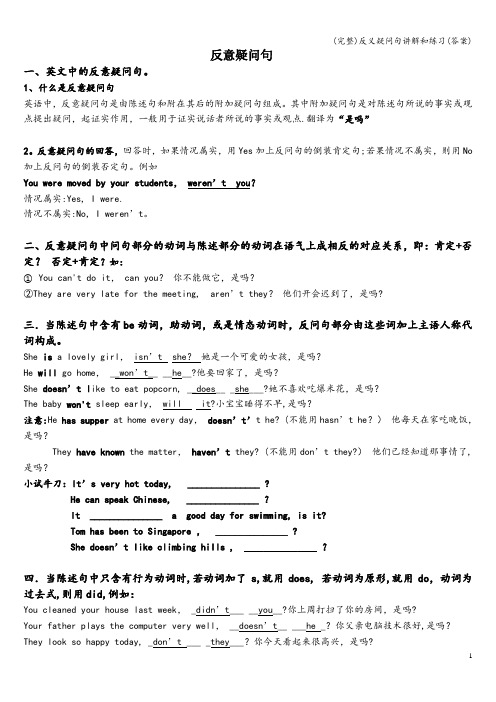
反意疑问句一、英文中的反意疑问句。
1、什么是反意疑问句英语中,反意疑问句是由陈述句和附在其后的附加疑问句组成。
其中附加疑问句是对陈述句所说的事实或观点提出疑问,起证实作用,一般用于证实说话者所说的事实或观点.翻译为“是吗”2。
反意疑问句的回答,回答时,如果情况属实,用Yes加上反问句的倒装肯定句;若果情况不属实,则用No 加上反问句的倒装否定句。
例如You were moved by your students,weren’t you?情况属实:Yes, I were.情况不属实:No, I weren’t。
二、反意疑问句中问句部分的动词与陈述部分的动词在语气上成相反的对应关系,即:肯定+否定?否定+肯定?如:①You can't do it, can you?你不能做它,是吗?②They are very late for the meeting, aren’t they?他们开会迟到了,是吗?三.当陈述句中含有be动词,助动词,或是情态动词时,反问句部分由这些词加上主语人称代词构成。
She is a lovely girl,isn’t she?她是一个可爱的女孩,是吗?He will go home, __won’t__ __he__?他要回家了,是吗?She doesn’t l ike to eat popcorn, __does__ _she___?她不喜欢吃爆米花,是吗?The baby won't sleep early, will it?小宝宝睡得不早,是吗?注意:He has supper at home every day,doesn’t’t he? (不能用hasn’t he?)他每天在家吃晚饭,是吗?They have known the matter,haven’t they? (不能用don’t they?)他们已经知道那事情了,是吗?小试牛刀:It’s very hot today, _______________ ?He can speak Chinese, _______________ ?It _______________ a good day for swimming, is it?Tom has been to Singapore , _______________ ?She do esn’t like climbing hills , _______________ ?四.当陈述句中只含有行为动词时,若动词加了s,就用does, 若动词为原形,就用do,动词为过去式,则用did,例如:You cleaned your house last week, _didn’t___ __you__?你上周打扫了你的房间,是吗?Your father plays the computer very well, __doesn’t__ ___he _?你父亲电脑技术很好,是吗?They look so happy today, _don’t ___ _they___?你今天看起来很高兴,是吗?小试牛刀: Meimei studies in a middle school, _______________ ?He loves cold weather , _______________ ?You finished the task yesterday, _______________ ?五.反意疑问句的陈述部分带有little, few, never, hardly, seldom,nobody, nothing,barely, scarcely等否定意义的词时,问句部分用肯定式.如:①She never tells a lie, does she?(不用doesn’t she?)她从不说谎,是吗?②He was seldom late, was he?(不用wasn’t he?) 他几乎不迟到,是吗?小试牛刀:Few students can answer the question, _______________ ?He can hardly finish his homework, _______________ ?六、反意疑问句的陈述部分为I am……时,问句部分习惯上用aren’t I?表示.如:I am a very honest man, aren’t I? 我是个很诚实的人,是吗?小试牛刀:I’m in Class 3,Grade 2, _______________ ?I’m ten years old, _______________ ?七.陈述部分的主语为不定代词something, anything, nothing, everything时,问句部分的主语用it。
反义疑问句用法及练习题(附答案)
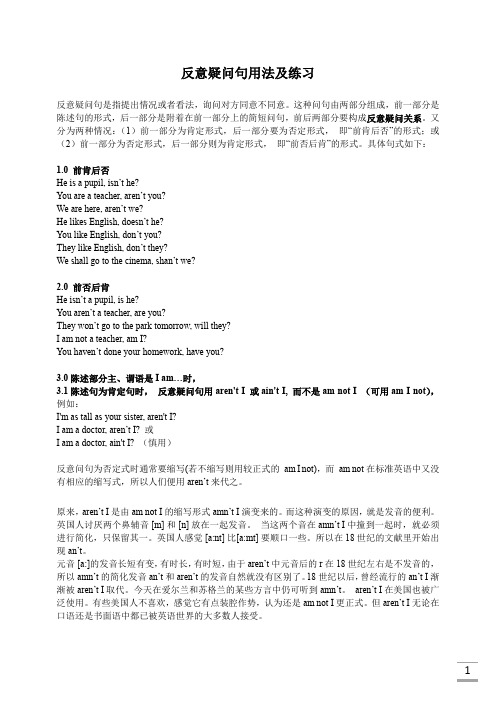
反意疑问句用法及练习反意疑问句是指提出情况或者看法,询问对方同意不同意。
这种问句由两部分组成,前一部分是陈述句的形式,后一部分是附着在前一部分上的简短问句,前后两部分要构成反意疑问关系。
又分为两种情况:(1)前一部分为肯定形式,后一部分要为否定形式,即“前肯后否”的形式;或(2)前一部分为否定形式,后一部分则为肯定形式,即“前否后肯”的形式。
具体句式如下:1.0 前肯后否He is a pupil, isn’t he?You are a teacher, aren’t you?We are here, aren’t we?He likes English, doesn’t he?You like English, don’t you?They like English, don’t they?We shall go to the cinema, shan’t we?2.0 前否后肯He isn’t a pupil, is he?You aren’t a teacher, are you?They won’t go to the park tomorrow, will they?I am not a teacher, am I?You haven’t done your homework, have you?3.0陈述部分主、谓语是I am…时,3.1陈述句为肯定句时,反意疑问句用aren't I 或ain't I, 而不是am not I (可用am I not),例如:I'm as tall as your sister, aren't I?I am a doctor, aren’t I?或I am a doctor, ain't I? (慎用)反意问句为否定式时通常要缩写(若不缩写则用较正式的am I not),而am not在标准英语中又没有相应的缩写式,所以人们便用aren’t来代之。
新人教版必修一Unit3 重点语法:反义疑问句学习讲义+练习题

语法:反意疑问句一、基本用法与结构反意疑问句由“陈述句+简略疑问句”两部分组成,第一部分提出一种看法,第二部分用来质疑或表示证实。
陈述部分与疑问部分的动词时态和动词性质应保持一致,而且肯定和否定形式彼此相反,即陈述部分为肯定式时,疑问部分用否定式,陈述部分为否定式时,疑问部分用肯定式:He likes English, doesn’t he? 他喜欢英语,是吗?He doesn’t like English, does he? 他不喜欢英语,是吗?【注】1. 若陈述部分含有seldom, hardly, never, few, nothing等否定词或半否定词,其疑问部分要用肯式:He has few friends here, has he? 他在这儿几乎没什么朋友,是吗?She said nothing, did she? 她什么也没说,是不是?2. 若陈述部分含有带否定前缀的词,疑问部分仍用否定式:It is unfair, isn’t it? 这不公平,不是吗?It is impossible, isn’t it? 那是不可能的,是吗?二、反意疑问句的主语问题1. 基本原则:疑问部分的主语应与陈述部分主语一致,且只能是代词:Mary is a nurse, isn’t she? 玛丽是护士,对吗?2. 当陈述部分为there be句型时,疑问部分仍用there作“主语”:There was nothing in the room, was there? 房间里什么也没有,是吗?3. 当陈述部分的主语是指示代词时,疑问部分用it, they等代词:That is a new car, isn’t it? 这是一辆新汽车,是吗?4. 当陈述部分的主语是复合不定代词时,若陈述部分的主语为somebody, someone, everyone, everybody, no one, nobody等复合不定代词,其反意疑问句的主语在正式文体中用he,在口语或非正式文体中通常用they:Nobody was late, were they? 没有一个人迟到,是吗?5.当陈述部分的主语是something, anything, nothing, everything等复合不定代词时,其反意疑问句的主语要用it:Everything is ready, isn’t it? 一切都准备好了吗?Nothing is important, is it? 没有什么重要的,不是吗?三、陈述部分有动词have的反意疑问句1. 当have 为助动词时,其反意疑问句沿用同样的助动词:He has already left, hasn’t he? 他已经离开了,是吗?2. 当have 为实意动词时,要分两种情况:① 若表示“所有”,反意疑问句可以用have,也可以用do:He has a lot of friends here, hasn’t [doesn’t] he? 他在这儿有许多朋友,是吗?但是若陈述部分用的是have的否定式,反意疑问句用have 还是用do,取决于陈述部分的动词形式:He hasn’t any money, has he? 他没有钱,是吗?He doesn’t have any money, does he? 他没有钱,是吗?① 若表示“吃”、“玩”等意思,反意疑问句要用do:He has supper at 5, doesn’t he? 他5点吃晚餐,是吗?He had a good time at the party, didn’t he? 他在晚会上玩得很开心,是吗?3. 当用于have to时,通常也有两种可能:若表示经常性的行为,则多用加助动词do的形式;若表示特定的行为,则多用have:He often has to get up early, doesn’t he? 他经常要早起,是吗?He has to go to bed late tonight, hasn’t he? 他今晚要迟睡,是吗?四、含情态动词的反意疑问句1. 基本原则:在通常情况下,当陈述部分含有情态动词时,疑问部分会重复前面同样的情态动词:He can speak English, can’t he?他会说英语,是吗?We shouldn’t go, should we? 我们不应该去,对不对?2. 当陈述部分含有must时,要分两种情况:① 若must表示“必须”或“有必要”,疑问部分用mustn’t 或needn’t:You must leave at once, mustn’t [needn’t] you? 你必须(有必要)马上离开,是吗?但是若陈述部分有mustn’t表示禁止,疑问部分要must:You mustn’t laugh, must you? 你不准笑,知道吗?① 若must表示推测,疑问部分不能用must,而应根据must后的动词结构采用相应的动词形式:He must be tired, isn’t he? 他一定累了,是吗?五、陈述部分为祈使句的反意疑问句1. 基本原则:若陈述部分为祈使句,疑问部分通常用will you:Please help us, will you? 请帮帮我们,好吗?Come with us, will you? 同我们一起去,好吗?Don’t forget to post the letter, will you? 请别忘了寄信。
反义疑问句详解及练习题(带答案)

反义疑问句的用法1.定义: 反义疑问句,表示说话人提出看法、建议或意见,问对方同意与否。
2.结构:有两部分组成,前一部分为陈述形式,后一部分为疑问句。
3. 形式:前肯后否与前否后肯。
Lucy isn't beautiful, is she?露西不漂亮,是吗?Li Ming is pretty handsome, isn't he?黎明相当帅,不是吗?4. 回答:肯定回答:“Yes+肯定结构”,否定回答“No+否定结构”,但是注意“Yes”要译为“不”,“No”要译为“是”。
-Your sister is a teacher, isn't she?你妹妹是老师,不是吗?-Yes, she is. 不,她是老师。
-You can play the guitar, can't you?你会弹吉他,不是吗?-No, I can't. 是的,我不会。
特别注意:1)当陈述部分为否定式,反意疑问句为肯定式时,其回答往往与汉语不一致"It isn ’t cheap, is it?" "Yes, it is." “它不便宜吧?”“不,很便宜。
”"He doesn’t love her, does he?" "No, he doesn’t."“他不爱她,是吗?”“是的,他不爱她。
”此时,"Yes" 即不,对前面"It isn't cheap." 的否定。
否定反意疑问句的回答当陈述部分为肯定式,反意疑问句为否定式时,其回答一般不会造成困难,一般只需照情况回答即可:"It ’s new, isn’t it?" "Yes, it is." “是新的,对吗?”“对,是新的。
”"He wants to go, doesn’t he?" "No, he doesn’t." “他想去,对吗?”“不,他不想去。
中考英语反意疑问句练习题20题(带答案)

中考英语反意疑问句练习题20题(带答案)1. You like reading books, don't you?A. Yes, I doB. No, I don't答案解析:这是一个前肯后否的反意疑问句。
陈述句部分是“你喜欢读书”,反意疑问句部分“don't you”表示询问对方是否真的喜欢。
如果喜欢就回答“Yes, I do”(是的,我喜欢),如果不喜欢就回答“No,I don't” 不,我不喜欢)。
这里答案根据实际情况选择。
2. He doesn't go to school by bike, does he?A. Yes, he doesB. No, he doesn't答案解析:这是前否后肯的反意疑问句。
陈述句部分“他不骑自行车去上学”,反意疑问句部分“does he”。
如果他实际上骑自行车上学,就回答“Yes, he does”( 不,他骑),如果他确实不骑,就回答“No, he doesn't” 是的,他不骑)。
3. They have been to Paris, haven't they?A. Yes, they haveB. No, they haven't答案解析:前肯后否的反意疑问句。
陈述句部分“他们去过巴黎”,反意疑问句部分“haven't they”。
如果去过就回答“Yes, they have” 是的,他们去过),没去过就回答“No, they haven't”( 不,他们没去过)。
4. She didn't watch the movie last night, did she?A. Yes, she didB. No, she didn't答案解析:前否后肯的反意疑问句。
陈述句部分“她昨晚没看电影”,反意疑问句部分“did she”。
如果她看了就回答“Yes, she did”( 不,她看了),没看就回答“No, she didn't” 是的,她没看)。
(完整版)反义疑问句练习题及答案讲解
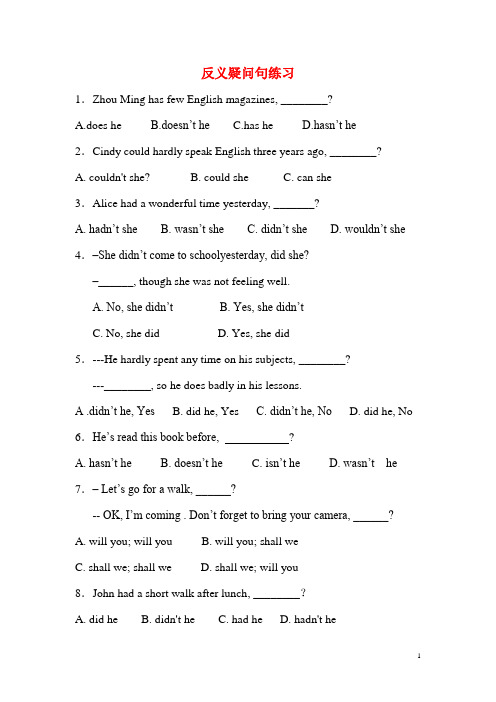
反义疑问句练习1.Zhou Ming has few English magazines, ________?A.does heB.doesn’t heC.has heD.hasn’t he2.Cindy could hardly speak English three years ago, ________?A. couldn't she?B. could sheC. can she3.Alice had a wonderful time yesterday, _______?A. hadn’t sheB. wasn’t sheC. didn’t sheD. wouldn’t she 4.–She didn’t come to schoolyesterday, did she?–______, though she was not feeling well.A. No, she didn’tB. Yes, she didn’tC. No, she didD. Yes, she did5.---He hardly spent any time on his subjects, ________?---________, so he does badly in his lessons.A .didn’t he, Yes B. did he, Yes C. didn’t he, No D. did he, No 6.He’s read this book before, ?A. hasn’t heB. doesn’t heC. isn’t heD. wasn’t he 7.–Let’s go for a walk, ______?-- OK, I’m coming . Don’t forget to bring your camera, ______? A. will you; will you B. will you; shall weC. shall we; shall weD. shall we; will you8.John had a short walk after lunch, ________?A. did heB. didn't heC. had heD. hadn't he9.Nancy hardly rings you up, ___________?A. doesn’t sheB. does sheC. doesn’t NancyD. does Nancy 10.---Your brother often disagrees with you, _______ he ?--- _______. We often have different opinions.A.does; YesB. doesn’t ;YesC. does; NoD. doesn’t; No 11.Kate’s never late for school,?A.isn’t sheB.hasn’theC.is sheD.has she12.--- Liu Tao has never read the book The Adventure of Tom Sawyer , _______ he?--- _____. He told me it's very interesting. He'd like to read it again.A. is; No, he isn'tB. has; Yes, he hasC. isn’t; Yes, he isD. hasn’t; No, he hasn't13.—He’s never late for school, ________?—No, he isn’t .He is always very early.A. is heB. isn’t heC. hasn’t heD. has he 14.—There’s little meat left in the fridge, ________?—________. I’ll get some on my way home.A. is there, YesB. isn’t there, YesC. is there, NoD. isn’t there, No15.—Tom finished his homework, didn’t he?—__________, though he was ill yesterday.A. No, he didn’tB. Yes, he didC. Yes, he doesD. No, he doesn’t16.There is little water in the cup, ?A. is thereB. isn’t thereC. isn’t itD. is it17. He’s still not understood by his close friend although he has said sorryto him, _________?A. hasn’t heB. has heC. isn’t heD. is he18.You have never visited the place before, you?A. didB. didn’tC. haveD. haven’t19.Don't keep poison in the kitchen, _______?A. do youB. shall weC. will youD. don't you20.There are no museums in our city, _________?A. aren’t thereB. are thereC. is thereD. isn’t there21.Your father is playing the piano very well, he?A.isB.isn’tC.doesD.doesn’t22.—It’s her birthday tomorrow, ______ ?—Yes, let’s have a surprise party for her.A. isn’t itB. isn’t sheC. doesn’t itD. doesn’t she23.--- He’s never stolen anything before, _______ he?--- ________. It’s h is third time to be taken to the police station.A. hasn’t; YesB. has; NoC. has; YesD. is; No24.—It’s her birthday tomorrow, ______ ?—Yes, let’s have a surprise party for her.A. isn’t itB. isn’t sheC. doesn’t itD. doesn’t she25.-----Your father never watched the drama series on TV, __________? -----_____________________. He thinks theses drama series are boring and dull.A.does he; Yes, he does.B. does he; No, he doesn’tC. doesn’t he ; Yes, he does.D. doesn’t he ; No, he doesn’t .26.—Tom is an honest boy, _______ he?—Yes. We trust him all the time.A. isn’tB. isC. doesD. doesn’t27.Good, you’ve done it well! You need no more help from us, ______.?A. do youB. need youC. don’t youD. needn’t you28.His father had an important meeting just now, _______?A. did heB. had heC. didn't heD. hadn't he29.-- You used to be short, didn’t you?-- _______. I was the shortest in my class.A. Yes, I did.B. No, I didn’t.C. Yes, I was.D. No, I wasn’t.参考答案1.A【解析】试题分析:句意为:周明几乎没有英语杂志对吗?这是一个反义疑问句,反义疑问句的结构遵循前肯定后否定或者前否定后肯定,前后人称、时态一致的原则。
反义疑问句的讲解及练习(含答案)
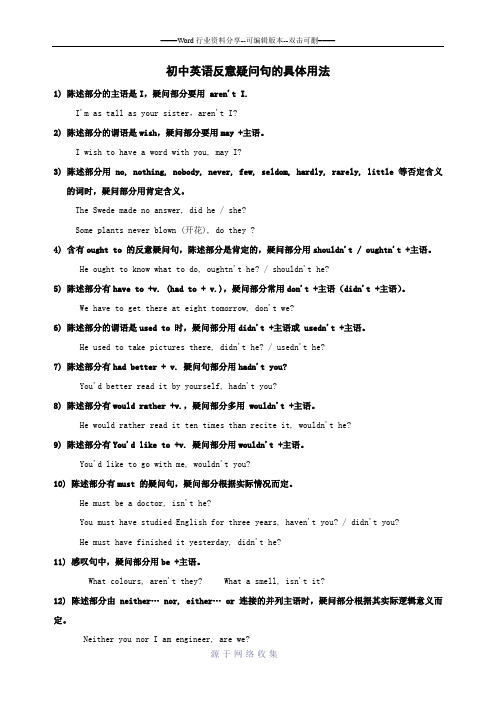
初中英语反意疑问句的具体用法1) 陈述部分的主语是I,疑问部分要用 aren't I.I'm as tall as your sister,aren't I?2) 陈述部分的谓语是wish,疑问部分要用may +主语。
I wish to have a word with you, may I?3) 陈述部分用 no, nothing, nobody, never, few, seldom, hardly, rarely, little等否定含义的词时,疑问部分用肯定含义。
The Swede made no answer, did he / she?Some plants never blown (开花), do they ?4) 含有ought to 的反意疑问句,陈述部分是肯定的,疑问部分用shouldn't / oughtn't +主语。
He ought to know what to do, oughtn't he? / shouldn't he?5) 陈述部分有have to +v. (had to + v.),疑问部分常用don't +主语(didn't +主语)。
We have to get there at eight tomorrow, don't we?6) 陈述部分的谓语是used to 时,疑问部分用didn't +主语或 usedn't +主语。
He used to take pictures there, didn't he? / usedn't he?7) 陈述部分有had better + v. 疑问句部分用hadn't you?You'd better read it by yourself, hadn't you?8) 陈述部分有would rather +v.,疑问部分多用 wouldn't +主语。
(完整版)反义疑问句练习(带答案)
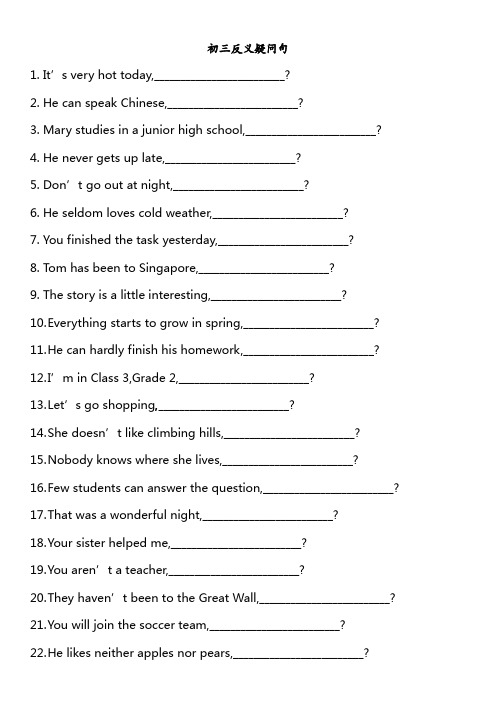
初三反义疑问句1.It’s very hot today,_________________________?2.He can speak Chinese,_________________________?3.Mary studies in a junior high school,_________________________?4.He never gets up late,_________________________?5.Don’t go out at night,_________________________?6.He seldom loves cold weather,_________________________?7.You finished the task yesterday,_________________________?8.Tom has been to Singapore,_________________________?9.The story is a little interesting,_________________________?10.E verything starts to grow in spring,_________________________?11.H e can hardly finish his homework,_________________________?12.I’m in Class 3,Grade 2,_________________________?13.L et’s go shopping,_________________________?14.S he doesn’t like climbing hills,_________________________?15.N obody knows where she lives,_________________________?16.F ew students can answer the question,_________________________?17.T hat was a wonderful night,_________________________?18.Y our sister helped me,_________________________?19.Y ou aren’t a teacher,_________________________?20.T hey haven’t been to the Great Wall,_________________________?21.Y ou will join the soccer team,_________________________?22.H e likes neither apples nor pears,_________________________?23.T here are some good books for you,_________________________?24.L et’s do it now,_________________________?25.Y ou dislike this kind of gifts,_________________________?26.N othing is impossible,_________________________?27.E verything is possible,_________________________?28.H e doesn’t go to school by bus,_________________________?29.T here is little milk lsft in the bottle,_________________________?30.L et us clean the classroom by ourselves,_________________________?31.H e has studied here for about four years,_________________________?32.Y ou never lost money before,_________________________?33.F ew of them hurt themselves in the accident last night,_________________________?34.P eter could hardly see the words on the blackboard,_________________________?35.T here will be a volleyball match in our school,_________________________?36.D on’t smoke in the reading room,_________________________?37.I don’t think he is right,_________________________?38.Y ou must do your homework by yourself,_________________________?39.Y ou mustn’t touch the machine,_________________________?40.S omeone looked for you yesterday,_________________________?1.isn’t it2.can’t he3.doesn’t she4.does he5.will you6.does he7.didn’t you8.hasn’t he9.isn’t it 10.doesn’t it 11.c an he 12.aren’t I 13.shall we 14.does she 15.do they/does he16.c an they 17.wasn’t it 18.didn’t she 19.are you 20.have they21.w on’t you 22.does he 23.aren’t there 24.shall we 25.don’t you 26.i s it 27.isn’t it 28.does he 29.is there 30.will you 31.hasn’t he 32.d id you 33.did they 34. could he 35.won’t there 36.will you37.is he 38.mustn’t you 39.must you 40.didn’t they/didn’t he。
反义疑问句详细讲解及习题及答案教学教材
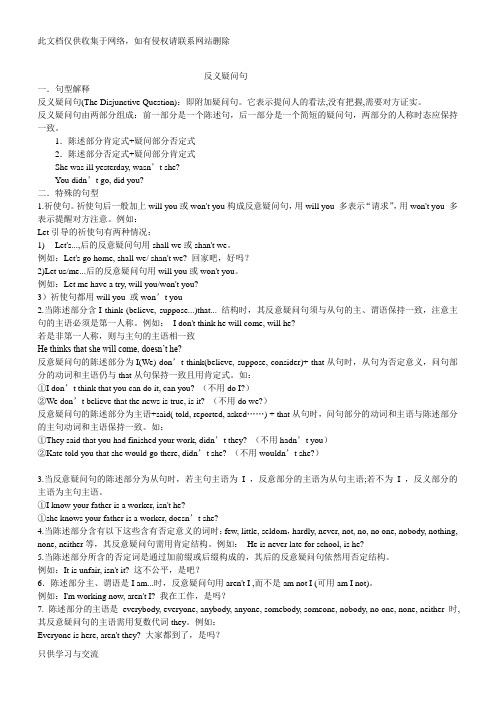
反义疑问句一.句型解释反义疑问句(The Disjunctive Question):即附加疑问句。
它表示提问人的看法,没有把握,需要对方证实。
反义疑问句由两部分组成:前一部分是一个陈述句,后一部分是一个简短的疑问句,两部分的人称时态应保持一致。
1.陈述部分肯定式+疑问部分否定式2.陈述部分否定式+疑问部分肯定式She was ill yesterday, wasn’t she?You didn’t go, did you?二.特殊的句型1.祈使句。
祈使句后一般加上will you或won't you构成反意疑问句,用will you 多表示“请求”,用won't you 多表示提醒对方注意。
例如:Let引导的祈使句有两种情况:1) Let's...,后的反意疑问句用shall we或shan't we。
例如:Let's go home, shall we/ shan't we? 回家吧,好吗?2)Let us/me...后的反意疑问句用will you或won't you。
例如:Let me have a try, will you/won't you?3)祈使句都用will you 或won’t you2.当陈述部分含I think (believe, suppose...)that... 结构时,其反意疑问句须与从句的主、谓语保持一致,注意主句的主语必须是第一人称。
例如:I don't think he will come, will he?若是非第一人称,则与主句的主语相一致He thinks that she will come, doesn’t he?反意疑问句的陈述部分为I(We) don’t think(believe, suppose, consider)+ that从句时,从句为否定意义,问句部分的动词和主语仍与that从句保持一致且用肯定式。
反义疑问句练习题(附答案)

反意疑问句一、祈使句后的反意疑问句:祈使句后加一个反意疑问句,使祈使句变得更加委婉。
肯定祈使句的反意疑问句通常用will you, won’t you, would you, can you, can’t you等来表达不同的含义。
在否定的祈使句后的反意疑问句通常只用will you。
1、表示“请求”,肯定祈使句的反意疑问句用will you。
如:Give me a hand, will you?2、表示“邀请”、“劝诱”时,肯定祈使句后的反意疑问句用won’t you。
如:Have another cup of tea, won’t you?3、表示“催促”、“不耐烦”时,肯定祈使句后的反意疑问句用can’t you。
如:Stop talking, can’t you?4、用“Let’s…”开头的肯定祈使句表示“提议、建议、主张”,其后的反意疑问句用shall we。
如:Let’s have a try, shall we?但是以Let us…或Let me…开头的祈使句后的反意疑问句则要用will you。
如:Let us go now, will you?5、否定祈使句的反意疑问句只用will you。
如:Don’t take away my dictionary, will you?以Let’s not…开头的祈使句后的反意疑问句,用all right或OK。
二、复合句的反意疑问句其反意疑问的主谓语视其主要内容而定,不能一概说以主句为准还是以从句为准。
1、多数复合句后的反意疑问句的主、谓语同主句的主、谓语一致。
如:He said he was a teacher, didn’t he2、①主句是I think(suppose, consider, believe, guess, expect, imagine, feel, am afraid, hear, say等)+宾语从句时,反意疑问句的主、谓语应与从句的主、谓语一致。
初中反义疑问句的专项训练以及答案精讲
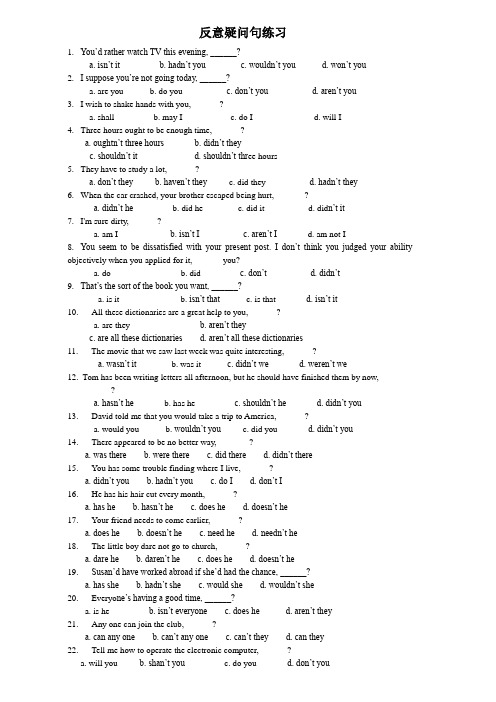
反意疑问句练习1. Y ou’d rather watch TV this evening, ______?a. isn’t itb. hadn’t youc. wouldn’t youd. won’t you2. I suppose you’re not going today, ______?a. are youb. do youc. don’t youd. aren’t you3. I wish to shake hands with you, ______?a. shallb. may Ic. do Id. will I4. Three hours ought to be enough time, ______?a. oughtn’t three hoursb. didn’t theyc. shouldn’t itd. shouldn’t thr ee hours5. They have to study a lot, ______?a. don’t theyb. haven’t theyc. did theyd. hadn’t they6. When the car crashed, your brother escaped being hurt, ______ ?a. didn’t heb. did hec. did itd. did n’t it7. I'm sure dirty, ______?a. am Ib. isn’t Ic. aren’t Id. am not I8. Y ou seem to be dissatisfied with your present post. I don’t think you judged your ability objectively when you applied for it, ______ you?a. dob. didc. don’td. didn’t9. That’s the sort of the book you want, ______?a. is itb. isn’t thatc. is thatd. isn’t it10. All these dictionaries are a great help to you, ______?a. are theyb. aren’t theyc. are all these dictionariesd. aren’t all these dictionaries11. The movie that we saw last week was quite interesting, ______?a. wasn’t itb. was itc. didn’t wed. weren’t we12. Tom has been writing letters all afternoon, but he should have finished them by now,______?a. hasn’t heb. has hec. shouldn’t hed. didn’t you13. David told me that you would take a trip to America, ______?a. would youb. wouldn’t youc. did youd. didn’t you14. There appeared to be no better way, _______?a. was thereb. were therec. did thered. didn’t there15. Y ou has some trouble finding where I live, ______?a. didn’t youb. hadn’t youc. do Id. don’t I16. He has his hair cut every month, ______?a. has heb. hasn’t hec. does hed. doesn’t he17. Y our friend needs to come earlier, ______?a. does heb. doesn’t hec. need hed. needn’t he18. The little boy dare not go to church, ______?a. dare heb. daren’t hec. does hed. doesn’t he19. Susan’d have worked abroad if she’d had the chance, ______?a. has sheb. hadn’t shec. would shed. wouldn’t she20. Everyo ne’s having a good time, ______?a. is heb. isn’t everyonec. does hed. aren’t they21. Any one can join the club, ______?a. can any oneb. can’t any onec. can’t theyd. can they22. Tell me how to operate the electronic computer, ______?a. will youb. shan’t youc. do youd. don’t you23. Magaret scarcely comes to visit you on Christmas Day, ______?a. doesn’t sheb. does shec. do youd. don’t you24. Let’s listen to the radio program that the teacher mentioned, ______?a. do web. don’t wec. shall wed. shan’t we25. Y ou think you’re funny, ______?a. didn’t youb. are youc. don’t youd. do you26. Janet used to take part in labor in that village, ______?a. used sheb. did shec. didn’t shed. should she27. What beautiful weather, ______?a. is itb. isn’t itc. won’t itd. doesn’t it28. He ought to go to Kwangchow by plane, ______?a. should heb. shouldn’t hec. would hed. wouldn’t he29. We never dared to ask him a question, ______?a. did web. didn’t wec. dared wed. daren’t we30. Nobody will believe how difficult his work has been ______?a. will heb. won’t nobodyc. will theyd. won’t they31. Y ou must have made the mistake, ______?a. mustn’t youb. haven’t youc. didn’t youd. hadn’t you32. Learning how to repair computers takes a long time, ______?a. isn’t itb. aren’t theyc. doesn’t itd. don’t they33. Jack has coffee with breakfast, ______?a. hasn’t Jackb. hasn’t hec. doesn’t Jackd. doesn’t he34. They must have stayed at hotel last night, ______?a. mustn’t theyb. haven’t theyc. didn’t theyd. hadn’t they35. There isn’t anything wrong with the radio, ______?a. is thereb. is itc. does itd. does there36. Y ou must be hungry, ______?a. must youb. mustn’t youc. are youd. aren’t you37. Let’s do the exercises by ourselves, ______?a. shall web. shan’t wec. will youd. will we38. Her daughter had the carpets and curtains cleaned, ______?a. had sheb. hadn’t shec. didn’t shed. didn’t her daughter39. The teacher had a talk with you, ______?a. has youb. hadn’t shec. did shed. didn’t she40. Something’ll have to be done about the air pollution, ______?a. won’t itb. will itc. has itd. does it反义疑问句(二)1、Few of them hurt themselves in the accident last night,________A. don’t theyB. didn’t theyC. did theyD. do they2、-Y ou’ve never seen dinosaur eggs, have you ?--_____. How I wish to visit the Dinosaur World.A. Yes, I haveB. No, I haven’tC. Certainly, I haveD. Of course, I haven’t3、His sister had a bad cough, ______she?A. wasn’tB. doesn’tC. hadn’tD. didn’t4、Mr. Green went to Shenzhen on business last week,________?A. isn’t heB. doesn’t heC. didn’t heD. hasn’t he5、ohn can hardly understand any Chinese, _________he?A. Can’tB. doesn’tC. canD. does6、Don’t smoke in the meeting-room,_________?A. do youB. will youC. can youD. could you7、Lucy, you clean the blackboard today,_______A. do youB. did youC. will youD. can you8、Miss Cheng will never forget her first visit to Canada ,________?A. will sheB. won’t sheC. isn’t she D wasn’t she9、The lady couldn’t say a word when she saw the snake,________?A. could the ladyB. couldn’t the ladyC. could sheD. couldn’t she反义疑问句(三)1. Y ou are an actor, ________ _____ ?2. He is a good boy, ________ ______ ?3. It was fine yesterday, _______ ___ ?4. Y ou were studying when I called you last night, __________ _____ ?5. She is going to visit me, _____ ____?6. I am Chinese, ______you ?7. It often rains here, ________ ___ ?8. He likes soccer, _________ ____ ? 9. Y ou have a headache, _______ ___ ?10. I called you yesterday, _______ __? 11. Y ou will go to America, ______ ___ ?12. We have ever been to Shanghai, _________ ______ ?13. His mother is a doctor, ______ ____ ? 14. The dogs are fighting, _______ _____?15 There is a boy in our classroom, _______ _______ ?17. There were many cars in the street,_________ ________ ?18. There will be robots in our families,________ ______ ?19. Sit down please, _______________ ? 20. Please call me, _________________?21. Let’s go home,_________ ? 22. Let us go home, ________________ ?23 . Let me see, __________________ ?反义疑问句(四)1.My mom bought me a medium coke,_________?2.Y ou went to your grandma's home,__________?3.He will go home,________?4.She doesn't like to eat apples,_______?5.Y our room looks so big,_______?6.Y ou won't sleep early,_________?7.Y our are never late for school,___________?8.Y ou watched the football match last week,______?9.My mother is cooking,__________?10.Y our father plays the computer very well,__________?11.Y ou were moved by your students,________?12.Jogging makes us healthy,______________?13.The sewing machine can make the clothes,___________?14.My mother doesn't enjoy smoking,_________?15.Y ou don't want to bo a teacher in the future,________?16.Y ou look so happy today,________?Key:(一)1-5CABCA 6-10ACBDB反一11-15ACBDA 16-20DBADD21-25CABCD 26-30 C BBAC31-35BCDCA 36-40 DACDA(二)1-5CBDCC 6-10BCACD反二(三)1.aren't you2.isn't he3.wasn't it4.didn't you5.won't she6.aren't7.doesn't it8.doesn't he9.don't you 10.didn't you 11.won't you 12.haven't you 13.isn't she 14.aren't they 15.isn't there 17.weren'y there 18.won't there 19.will you 20.will you 21.shall we22.will you 23.will you(四)1. didn't she2. didn't you3. won't he4. does she5. doesn't it6. will you7. are you8. didn't you9. isn't she 10. doesn't he 11. weren't you 12. doesn't it 13.can't it 14. does she ...。
(完整版)反意疑问句精讲及专项练习(含答案)

反意疑问句在陈述句之后,附加一个简短问句,对陈述部分所述事实或观点提出疑问,叫反意疑问句。
附加问句的谓语动词及主语的形式均须与陈述部分保持一致,且主语必须用人称代词。
反意疑问句须遵循“前肯后否、前否后肯”的原则。
在中考题中,反意疑问句主要考查不同情况下专项练习:1. Tell me how to solve this problem, ____?A. do youB. don't youC. will youD. shan't you2. Half an hour ought to be enough time, ____?A. shouldn't itB. didn't theyC. oughtn't half an hourD. shouldn't half an hour3. They have to go to school now, ____?A. haven't theyB. don't theyC. hadn't theyD. did they4. When the car crashed, your brother escaped being hurt, ____?A. did itB. didn't itC. didn't heD. did he5. I'm dirty, ____?A. am IB. isn't IC. aren't ID. am not I6. That's the sort of the book you want, ____?A. is thatB. isn't itC. is itD. isn't that7. I suppose you're not leaving, ____?A. are youB. don't youC. do youD. aren't you8. I wish to shake hands with you, ____?A shall I B. may IC. do ID. will I9. AIl these dictionaries are a great help to you, ____?A. aren't all theseB. are all these dictionariesC. aren't theyD. are they dictionaries10. The film that we saw last week was quite amazing, ____?A. was itB. wasn't itC. weren't weD. didn't we11. He has been writing letters all afternoon, but he should have finished them by now, ____?A. shouldn't heB. didn't youC. hasn't heD. has he12. We'd rather stay at home tonight, ____?A. isn't itB. hadn't weC. wouldn't weD. won't we13. There appeared to be no better way, ____?A. didn't thereB. were thereC. did thereD. was there14. You had some trouble finding where I live, ____?A. do IB. hadn't youC. didn't youD. don't I15. He has his hair cut every month, ____?A. has heB. hasn't heC. does heD. doesn't he16. Jim told me that he would take a trip to Britain, ____?A. would heB. wouldn't heC. did heD. didn't he17. Jimmy dare not go to church, ____?A. does heB. dare heC. daren't heD. doesn't he18. She would have worked abroad if she'd had the chance, ____?A. wouldn't sheB. would sheC. hadn't sheD. has she19. Everyone is enjoying themselves, ____?A. aren't theyB. isn't everyoneC. does heD. is he20. Anyone can have a meal here, ____?A. can theyB. can't anyoneC. can't theyD. can anyone21. Your friend needs to come earlier, ____?A. need heB. needn't heC. does heD. doesn't he22. Jenny scarcely comes to visit you, ____?A. does sheB. doesn't sheC. do youD. don't you23. Let's listen to the radio program that the teacher mentioned, ____?A. don't weB. do weC. shall weD. shan't we24. The teacher had a talk with you, ____?A. has youB. hadn't sheC. did sheD. didn't she25. You think you're funny, ____?A. do youB. are youC. don't youD. didn't you26. Janet used to take part in labor in that village, ____?A. used sheB. did sheC. didn't sheD. should she27. What a beautiful flower, ____?A. doesn't itB. isn't itC. won't itD. is it28. No one will believe how difficult his work has been, ____?A. will heB. won't nobodyC. will theyD. won't they29. You must have made the mistake, ____?A. mustn't youB. haven't youC. didn't youD. hadn't you30. Learning how to repair computers takes a long time, ____?A. isn't itB. aren't theyC. doesn't itD. don't they31. Tom has milk with breakfast, ____?A. hasn't TomB. hasn't heC. doesn't TomD. doesn't he32. They must have stayed at hotel last night, ____?A. mustn't theyB. haven't theyC. didn't theyD. hadn't they33. Something'll have to be done about the air pollution, ____?A. won't itB. will itC. has itD. does it34. You must be hungry, ____?A. must youB. mustn't youC. are youD. aren't you35. She had the clothes cleaned, ____?A. had sheB. hadn't sheC. didn't sheD. didn't her daughter36. There isn't anything wrong with the car, ____?A. is thereB. is itC. does itD. does there答案:1-5 CABCC 6-10 BABCB 11-15 ACCBD 16-20 DBAAC 21-25 DACDC 26-30 CBABC 31-36 DCADCA。
反义疑问句练习题(附答案)
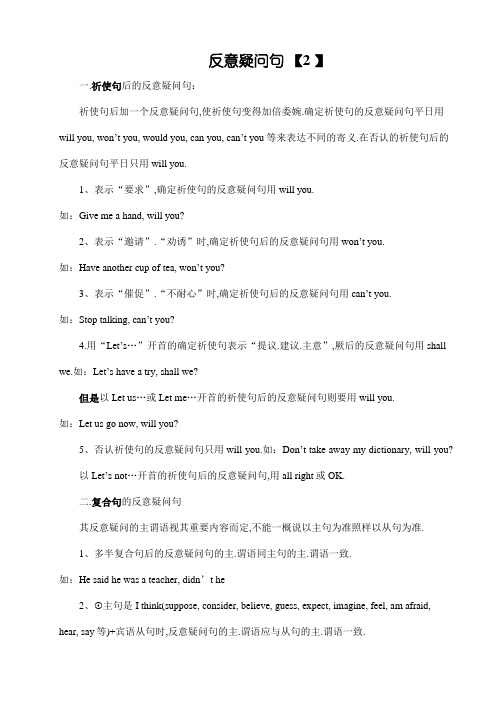
反意疑问句【2 】一.祈使句后的反意疑问句:祈使句后加一个反意疑问句,使祈使句变得加倍委婉.确定祈使句的反意疑问句平日用will you, won’t you, would you, can you, can’t you等来表达不同的寄义.在否认的祈使句后的反意疑问句平日只用will you.1、表示“要求”,确定祈使句的反意疑问句用will you.如:Give me a hand, will you?2、表示“邀请”.“劝诱”时,确定祈使句后的反意疑问句用won’t you.如:Have another cup of tea, won’t you?3、表示“催促”.“不耐心”时,确定祈使句后的反意疑问句用can’t you.如:Stop talking, can’t you?4.用“Let’s…”开首的确定祈使句表示“提议.建议.主意”,厥后的反意疑问句用shall we.如:Let’s have a try, shall we?但是以Let us…或Let me…开首的祈使句后的反意疑问句则要用will you.如:Let us go now, will you?5、否认祈使句的反意疑问句只用will you.如:Don’t take away my dictionary, will you?以Let’s not…开首的祈使句后的反意疑问句,用all right或OK.二.复合句的反意疑问句其反意疑问的主谓语视其重要内容而定,不能一概说以主句为准照样以从句为准.1、多半复合句后的反意疑问句的主.谓语同主句的主.谓语一致.如:He said he was a teacher, didn’t he2、 主句是I think(suppose, consider, believe, guess, expect, imagine, feel, am afraid, hear, say等)+宾语从句时,反意疑问句的主.谓语应与从句的主.谓语一致.如:I don’t think he will come, will he?②陈述部分假如是“I don’t think(believe,suppose,expect…)+宾语从句”时,疑问部分中的动词和主语应与宾语从句中的动词和主语保持一致,并且要用确定情势;因为主句中的否认其实是因后接的宾语从句转移到主句,其从句仍为否认句,故其答复运用确定式,如:--We don’t imagine the twins have arrived,have they?--Yes,they have.(不,他们到了)/No,they haven’t.(是的,他们没到)③当主句的主语为二.三人称即You/He/She/It thinks(suppose, consider, believe, guess, expect, imagine, feel, am afraid, hear,say等)+宾语从句时,厥后的问句应与主句相一致(此时,否认只看主句,与从句无关),如:Your sister supposes she needs no help,doesn’t she?3、并列复合句的反意疑问句的主.谓语应与邻近的分句的主.谓语相一致.如:John isn’t a hard-working student, for he has been late for three times, hasn’t he?三.含有情态动词或助动词的反意疑问句:1.当陈述部分含有情态动词must,其意义表示“必须.必要”时,厥后的反意疑问句用mustn’t或needn’t.如:①You must do it today, mustn’t you?②She must look after her sister, needn’t she?假如must的寄义表示“必定是.想必”等推想意义时,厥后的反意疑问句则要根据句中的谓语动词的时态构造采用be/have/did/do+not等响应情势.如:①He must bee ill, isn’t he?②You must have seen the film before, haven’t you?2.假如陈述部分用了must have+P.P.(曩昔分词),但明示或暗示了曩昔的时光,其反意疑问句用曩昔时.如:He must have seen him yesterday, didn’t he?3、陈述部分含情态动词ought to,厥后反意疑问句用oughtn’t或shouldn’t.如:I ought to come here, oughtn’t I?4、陈述部分含情态动词used to厥后反意疑问句用usedn’t或didn’t均可.如:Tom used to live here, usedn’t he?5、陈述部分含有have/has/had to时,厥后的反意疑问句用do的响应情势.如:You have to go, don’t you?但是在陈述句顶用have/has/had got to来代替have/has/had to时,反意疑问句用have的响应情势.如:Ann has got to see a doctor, hasn’t she?6.陈述部分有had better/would rather时,厥后的反意疑问句用hadn’t/wouldn’t.如:①You’d better not stay here, had you?②They would rather take this one, wouldn’t they?7.当陈述部分有dare或need时,若dare和need为实义动词疑问部分的谓语用do的恰当情势;若dare和need为情态动词,疑问部分用dare和need组成.Need与Dare 用法差别一. need的用法1)need可用作实义动词,意为"须要;必要",后面可接名词.动名词或动词不定式等作宾语.留意"n eed doing"表示被动意义,相当于need to be done.例如:I need a dictionary, so I need to go to the bookstore. 我须要一本词典,是以我要去趟书店. How often does your hair need washing(need to be washed)? 你的头发须要多久洗一次?2)need可用作情态动词,平日用于疑问句和否认句中,后接动词本相.这时need没有人称和数的变化,也没有时态的变化.例如:It's only eight o'clock. Need you go so early? 才八点.你须要去这么早吗?You needn't tell him about it as I have told him. 你不必跟他说那件事,我已经告知他了.3) needn't do与needn't have done的差别:两者都表示"不必做......".但前者表示如今或未来不必做;尔后者表示"曩昔(本来)不必做(而事实上已经做了)".例如:You needn't carry the desks out of the classroom when you clean the classroom. 你打扫教室时不必把桌子搬到教室外.You needn't have bought such a big TV as it takes too much room. 你本来不必买这么大的电视,它占领的空间太大了(而事实上已经买了).二.dare的用法1)dare用作实义动词,此时厥后的动词不定式可带to也可不带to,且dare有人称和数以实时态的变化.例如:I dare to jump down from the top of the wall. 我敢从那墙头上跳下来.She doesn't dare (to) meet her teacher's eyes. 她不敢与先生对视.2) dare用作情态动词,后跟动词本相,重要用于疑问句.否认句和前提句中.例如:How dare she do things like that to me? 她怎么敢对我做那种事?-Dare you catch the mouse? 你敢去抓那只老鼠吗? -I daren't do that. 我不敢抓.If you dare say that to our teacher, I would vote for you. 假如你敢向我们的先生说那件事,我就投你一票.四.陈述句主语是某些不定代词的反意疑问句:1.陈述句部分主语是everything, something, anything, nothing时,厥后的反意疑问句主语用it.如:①Everything seems all right, doesn’t it?②Nothing is in the box, is it?2.陈述部分的主语是everybody, somebody, anybody, nobody, everyone, no one, none, either, some one时,厥后的反意疑问句用主语they以统筹所指代的男.女两性.如:Everybody has got the new books, haven’t they?3.陈述部分主语是不定代词one时,厥后的反意疑问句一般用主语one.如:One can’t be always careful, can one?五.含有否认词或半否认词的反意疑问句:1.陈述部分含有no, never, seldom, hardly, rarely, scarely, few, little等否认或半否认意义的词时,都视为否认,故反意疑问句部分用确定情势.如:Few people knew the answer, did they?2.假如陈述部分的否认意义只是由单词加否认前缀组成时,厥后的反意疑问句一般要用否认情势.如:He is unhappy, isn’t he?六.陈述部分的主语是指导代词的反意疑问句:1.陈述部分主语是指导代词this, that时,厥后的反意疑问句用主语it.如:This is important, isn’t it?2.陈述部分主语是指导代词these, those时,厥后的反意疑问句用主语they.如:Those are mine, aren’t they?七.反意疑问句的其他特别情势:1.陈述部分是“I’m…”构造时,厥后的反意疑问句用aren’t I?如:I am a student, aren’t I ?2、陈述部分是there be或there live, there stand, there used to be等构造时,厥后的反意疑问句用主语there.如:There is something wrong with your bike, isn’t there?3.陈述部分的主语是动词不定式.动名词短语以及词组或从句时,厥后的反意疑问句用主语it.如:Doing eye exercises is good for your eyes, isn’t it?4.陈述句谓语部分消失否认词缀时,疑问部分仍用否认构造.如:He is unfit for his office, isn’t he?5、感慨句后的反意疑问句,动词用be的如今时,主语根据具体内容而定.①What a clever girl, isn’t she?②How beautiful the flowers are, aren’t they?一.选择1. Linda ate nothing this morning, ___? A. didn’t she B. was she C. did she D. wasn’t she2. There’s hardly___ milk in the bottle, _____there? A. no, isn’t B. some, is C. little, isn’t D. any, is3. He has never ridden a horse before, ___? A. does he B. has he C. hasn’t he D. doesn’t he4. —He seldom came here, _____? —Yes sir. A. didn’t he B. does he C. doesn’t he D. did he5. Everything seems all right, _____ ? A. does it B. don’t they C. won’t it D. doesn’t it 7. One can’t be too modest, can _____ ? A. one B. he C. it D. we 8. No one failed in the exam, _____ ? A. was he B. did one C. did they D. didn’t he 10. Neither you nor I am a artist, _____ ? A. am I B. aren’t we C. are we D. amn’t I 11. He can’t be her father, _____ he? A. is B. isn’t C. can D. can’t 12. They have no time to visit the museum, _____? A. do they B. haven’t they C. don’t they D.will they 14. You’d better go at once, _____ you? A. hadn’t B. did C. didn’t D. don’t 15. You’d rather work than play, _____ you? A. hadn’t B. wouldn’t C. didn’t D. mustn’t 16. You dare not do that, _____ you? A. don’t B. do C. dare D. daren’t 18. He dislikes the two subjects, _____ he?A. doesB. doesn’tC. isD. isn’t 19. These tools are useless now, _____ ? A. are they B. aren’t they C. is it D. isn’t it 20. He used to get up at 6:30, _____ he? A. didn’t he B. did he C. used he D. wouldn’t he 22. He ought to win the first prize, _______ he? A. mustn’t B. oughtn’t C. shouldn’t D. Both B and C. 23. Let’s go there by bus, ___? A. will you B. shall we C. don’t you D. will you 24. Let us go to play football, ___? A. will you B. shall we C. do we D. are we 25. Don’t forget to give Polly some food and change her water, ___? A. will you B. shall we C. won’t you D. do you 26. —Let’s go shopping this afternoon, _____? — All right. A. will we B. shall we C. don’t we D. are we 27. — Pass me the dictionary, _____? — Yes, with pleasure. A. would you B. will you C. won’t you D. wouldn’t you 30. There is little water in the glass,____? A. isn’t there B. isn’t it C. is it D. is there 32. There won’t be any concert this Saturday evening, _____ ? A. will there not B. will there C. is there D. won’t 33. — I guess she taught herself Japanese, ______? —Yes. A. don’t I B. did she C. do I D. didn’t she 34. I don’t believe you are right, _____ ? A. are you B. do you C. won’t you D. do 35. She doesn’t think that Tom sings best in the class, _____ ? A. does she B. doesn’t she C. does he D. doesn’t he 37.I know you didn’t want to hurt me, _____ ? A. did you B. didn’t you C. do I D. don’t I 38. If my father were here he would be very happy, _____ ? A. weren’t he B. were he C. wouldn’t he D. would he39. I don't think that the necklace is made of diamond, ________?A. do IB. do youC. isn't itD. is it40. His wife had the carpets and the curtains cleaned, ________?A. hadn'tB. hadC. didn't sheD. did she41.It's my son's wedding next week, and I have to do my best for that,_______ ?A. haven't IB. don't IC. don't heD. isn't it42.Harry wouldn't become a teacher if it hadn't been for the holiday, ______ ?A. would heB. had itC. would itD. had he43. No one left here yesterday,________?A. didn't theyB. did theyC. didn't oneD. did one44. Birds rarely build nests in our garden,________?A. don't theyB. do theyC. didn't theyD. did they45. You must have been to the Great Wall,____________?A. mustn't youB. haven't youC. aren't youD. must you46. learning how to repair motors takes a long time,________?A. doesn't itB. don't theyC. does itD. do they47.They must have stayed at home last night,________?A. mustn't theyB. haven't theyC. didn't theyD. must they48.I feel like going to the cinema tonight,________?A. don't IB. don't youC. do ID. do you49.Let's start out early tomorrow morning,________?A. shall weB. will youC. do youD. can't you50.There's not much news in today's newspaper,________?A. isn't itB. is itC. isn't thereD. is there51.They need our help badly at the moment,________?A. needn't theyB. need theyC. don't theyD. do they52.She is unfit for the position,________?A. is sheB. isn't sheC. doesn't sheD. does she53.I wish to visit America,________?A. don't IB. can IC. may ID. may you54.She's been a worker here for many years,________?A. isn't sheB. is sheC. hasn't sheD. has she55.What beautiful flowers,________?A. aren't theyB. are theyC. isn't itD. is it56.Mother used to live in a poor village,____________?A. used sheB. usedn't sheC. didn't heD. did he57.You'd better go at once,________?A. wouldn't youB. had youC. hadn't youD. should you58.I am very interested in Mark Twain's novels,________?A. aren't IB. am not IC. aren't youD. are you59.You’d rather watch TV this evening, ______? A. isn’t it B. hadn’t you C. wouldn’t you D. won’t you 60. I suppose you’re not going today, ______? A. are you B. do you C. don’t you D. aren’t you 61. I wish to shake hands with you, ______? A. shall B. may I C. do I D. will I 62. Three hours ought to be enough time, ______? A. oughtn’t three hours B. didn’t they C. shouldn’t it D. shouldn’t three hours 63. They have to study a lot, ______? a. don’t they b. haven’t they c. did they d. hadn’t they 64. When the car crashed, your brother escaped being hurt, ______ ? a. didn’t he b. did he c. did it d. didn’t it 65. I'm sure dirty, ______? a. am I b. isn’t I c. aren’t I d. am not I 66. You seem to be dissatisfied with your present post. I don’t think you judged your ability objectively when you applied for it, ______you? a. do b. did c. don’t d. didn’t 67. That’s the so rt of the book you want, ______? a. is it d. isn’t that c. is that d. isn’t it 68. All these dictionaries are a great help to you, ______?a. are theyb. aren’t theyc. are all these dictionariesd. aren’t all these dictionarie s69.The movie that we saw last week was quite interesting, ______? a. wasn’t it b. was it c. didn’t we d. weren’t we 70.Tom has been writing letters all afternoon, but he should have finished them by now, ______? a. hasn’t he b. has he c. s houldn’t he d. didn’t you71.David told me that you would take a trip to America, ______? a. would you b. wouldn’tyou c. did you d. didn’t you 72.There appeared to be no better way, _______? a. wasthere b. were there c. did there d. didn’t there 73. You has some trouble finding where I live, ______? a. didn’t you b. hadn’t you c. do I d. don’t I 74.He has his hair cut every month,______? a. has he b. hasn’t he c. does he d. doesn’t he 75.Your friend needs to come earlier, ______? a. does he b. doesn’t he c. need he d. needn’t he 76.The little boy dare not go to church, ______? a. dare he b. daren’t he c. does he d. doesn’t he 77. Susan’d have worked abroad if she’d had the chance, ______? a. has she b. hadn’t she c. would she d. wouldn’t she 78. Everyone’s having a good time, ______? a. is he b. isn’t everyone c. does he d. aren’t they 79.Any one can join the club, ______? a. can any one b. can’t any one c. can’t they d. can they 80.Tell me how to operate the electronic computer, ______? a. will you b. shan’t you c. do you d. don’t you 81.Magaret scarcely comes to visit you on Christmas Day, ______? a. doesn’t she b. does she c. do you d. don’t you 82. Let’s listen to the radio program that the teacher mentioned, ______? a. do we b. don’t we c. shall we d. shan’t we 83.You think you’re funny, ______? a. didn’t you b. are you c. don’t you d. do you 84.Janet used to take part in labor in that village, ______? a. used she b. did she c. didn’tshe d. should she 85.What beautiful weather, ______? a. is it b. isn’t it c. won’t it d.doesn’t it 86. He ought to go to Kwangchow by plane, ______? a. should he b. shouldn’t he c. would he d. wouldn’t he 87. We never dared to ask him a question, ______? a. did we b. didn’t we c. dared we d. daren’t we 88. Nobody will believe how difficult his work has been ______? a. will he b. won’t nobody c. will they d. won’t they 89.You must have made the mistake, ______? a. mustn’t you b. haven’t you c. didn’t you d. hadn’t you 90.Learning how to repair computers takes a long time, ______? a. isn’t it b. aren’t they c. doesn’t it d. don’t they 91.J ack has coffee with breakfast, ______? a. hasn’t Jack b. hasn’t he c. doesn’t Jack d. doesn’t he 92.They must have stayed at hotel last night, ______? a. mustn’t they b. haven’t they c. didn’t they d. hadn’t they 93.There isn’t anything w rong with the radio,______? a. is there b. is it c. does it d. does there 94.You must be hungry, ______? a. must you b. mustn’t you c. are you d. aren’t you 95.Let’s do the exercises by ourselves, ______?a. shall web. shan’t wec. will youd. will we 96.Her daughter had the carpets and curtains cleaned, ______? a. had she b. hadn’t she c. didn’t she d. didn’t her daughter 97.The teacher had a talk with you, ______? a. has you b. hadn’t she c. did she d. didn’t she二、填空1.Few of them hurt themselves in the accident last night, ___________ ?2.--You’ve never seen dinosaur eggs, have you ?--_______________. How I wish to visit the Dinosaur World.3.His sister had a bad cough, _________she?4.Mr. Green went to Shenzhen on business last week, ________?5. John can hardly understand any Chinese, _________he?6.Don’t smoke in the meeting-room, _________?7.Lucy, you clean the blackboard today, _______ ?8. Miss Cheng will never forget her first visit to Canada ,________?9.The lady couldn’t say a word when she saw the snake,__________?10.__________the population of china? 1,300,000,000.11.---______I go and meet you at the airport?---No ,thanks, dear . I can take a taxi home.12.------________is the Confucian Temple(孔庙) from here?------It’s about 10 minutes’ walk.13.-----_________may I keep these books? -----two weeks.14.Tina is unhappy now, ____________?15.---You won’t follow his example, will you ?---________________, I don’t think he is right.16.----__________do you go to Hong Kong?----sorry , I’ve never been there.17.---The boy has to stay at home to look after his little sister,_________?---Yes, because his mother has gone shopping.18.----You lent me some money a few months ago.-----_________? I don’t remember lending you any money .19.My uncle has never been to a foreign country,_____________?20.There is some water in that bottle, ___________?21.----_____________will the foreign students be back from NanJing?----In two days, I think .22.---Let’s go and play football,__________? ---That’s wonderful.23. I don’t think that the neckla ce is made of diamond, __________?24. His wife had the carpets and the curtains cleaned, ____________?25. It’s my son’s wedding next week, and I have to do my best for that,__________?26. Harry wouldn’t become a teacher if it hadn’t been for the holiday, __________?27. No one left here yesterday,_____________?28. Birds rarely build nests in our garden,_____________?29. You must have been to the Great Wall, ____________?30. Learning how to repair motors takes a long time, _____________?31. They must have stayed at home last night,____________?32. There’s not much news in today’s newspaper, _____________?33. They need our help badly at the moment, ______________?34. She is unfit for the position, _____________?35. I wish to visit America, _____________?36. She’s been a worker here for many years, ______________?37. What beautiful flowers, ______________?38. Mother used to live in a poor village, ____________?39.You’d better go at once, _____________?40.I am very interested in Mark Twain’s novels, ____________?41. He never gets up late , ?42. Don’t go out , ?43. Everything begins to grow in spring, ?44. He can hardly finish the work, ?45. Let us go home , ?46. You think he is a good student, ?47. Nobody knows where she lives, ?48. Few students can answer the question, ?49. Yo u needn’t attend the meeting, ______________________?50. We need to come on Sunday, ________________?。
反义疑问句讲解及习题及答案
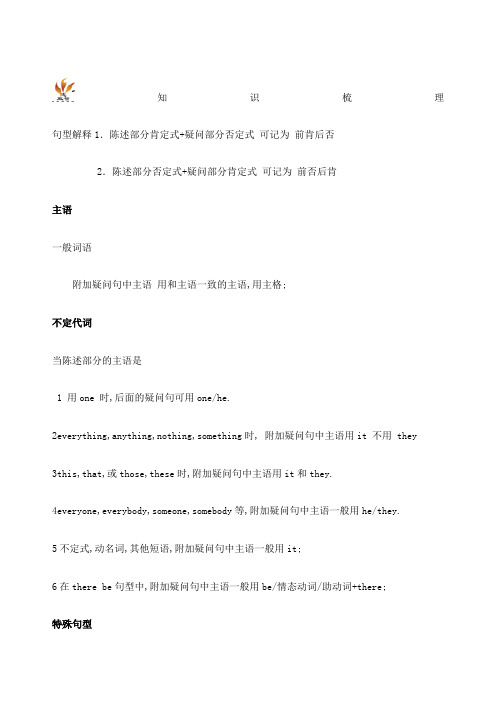
知识梳理句型解释1.陈述部分肯定式+疑问部分否定式可记为前肯后否2.陈述部分否定式+疑问部分肯定式可记为前否后肯主语一般词语附加疑问句中主语用和主语一致的主语,用主格;不定代词当陈述部分的主语是1 用one 时,后面的疑问句可用one/he.2everything,anything,nothing,something时, 附加疑问句中主语用it 不用 they3this,that,或those,these时,附加疑问句中主语用it和they.4everyone,everybody,someone,somebody等,附加疑问句中主语一般用he/they.5不定式,动名词,其他短语,附加疑问句中主语一般用it;6在there be句型中,附加疑问句中主语一般用be/情态动词/助动词+there;特殊句型否定意义的词否定意义的词1当陈述部分有never,seldom, hardly,few,little,barely, scarcely, nothing 等否定意义的词时,后面的反意疑问句则为肯定形式:There are few apples in the basket, are thereHe can hardly swim, can heThey seldom come late, do they2当陈述部分含有否定意思的词是unhappy,dislike,unfriendly等含有否定词缀的派生词,也就是有un-前缀、-less后缀等含有词缀而意思否定的词,当做肯定句处理,疑问部分要用否定形式;如:He looks unhappy,doesn't he他看上去不高兴,不是吗The girl dislikes history,doesn't she这女孩不喜欢历史,不是吗有less,fewer 等词视为肯定词,疑问部分用否定形式;如:There will be less pollution, won't there 表示主语主观意愿的词含有think, believe, suppose, imagine, expect等动词后接宾语从句构成的主从复合句在构成反意疑问句时,视情况不同有两种不同的构成方式;1.当主句的主语为第一人称时,其后的简短问句应与从句相一致;例如:I expect our English teacher will be back this weekend, won't she/heWe suppose you have finished the project, haven't you值得注意的是,当这些动词后接的宾语从句的否定转移到主句时,其仍属否定句,故其后的简短问句应用肯定式,而非否定式;例如:I don't believe that he can translate this book, can heWe don't imagine the twins have arrived, have they此类句子的回答同"前否后肯"型反意疑问句一样,如上述后一个句子,若双胞胎已经到了,则回答为"Yes, they have.";若尚未到达,使用"No, they haven't.";2.当主句的主语为第二、三人称时,其后的简短问句则应与主句相一致此时,否定只看主句,与从句无关...;例如:Your sister supposes she needs no help, doesn't sheYou thought they could have completed the project, didn't youThey don't believe she's an engineer, do theyShe doesn't expect that we are coming so soon, does she3但如果主句的时态是过去时等等,疑问句应和主句的人称时态保持一致;had better或have陈述部分有had better,或其中的have表示完成时态时,疑问句应用hadn’t等开头:You’d better get up early, hadn’t you其他情况句中有have时疑问句应用don't等开头如have表示“有”的时候,有两种形式:-He has two sisters,doesn't he-He doesn't have any sisters,doe she祈使句当陈述部分是祈使句时,疑问句要根据语气来表达当开头是Let‘s时,一定要用shall we;其余都用will you包括 Let us不论肯定否定Let’s go out for a walk, shall weLet us go out for a walk, will youLet me help you,may ITurn on the radio, will youThere be句型There be 句型中,反义疑问部分必须为be 动词 + thereThere are some apples in the basket, aren't thereThere isn't any milk left, is theremust.当陈述部分有情态动词must,问句有4种情况:1mustn't表示“禁止,不可,不必”时,附加问句通常要用must.You mustn't stop your car here,must you 你不能把车停在这地方,知道吗2must表示“有必要”时,附加问句通常要用needn't.They must finish the work today,needn't they 他们今天要完成这项工作,是吗3当must用来表示对现在的情况进行推测时,问句通常要根据must后面的动词采用相应的形式; He must be good at English,isn't he 他英语一定学得很好,是吗4当must+have done表示对过去的情况进行推测一般句中有明确的过去时间状语,问句要根据陈述部分谓语的情况用“didn't+主语”或“wasn't/weren't+主语”;如果强调动作的完成一般没有明确的过去时间状语,问句要用“haven't/hasn't+主语”;She must have read the novel last week,didn't she 她上星期一定读了这本小说,是吗You must have told her about it,haven't you 你一定把这事告诉她了,是吗回答反意疑问句的回答用yes, no, 但是,回答意思相反,当陈述部分是否定形式时,回答要按事实;如:They don’t work hard, do they 他们不太努力工作,是吗Yes, they do. 不,他们工作努力;/No, they don’t. 对, 他们工作不努力肯定反意疑问句的回答当陈述部分为否定式,反意疑问句为肯定式时,其回答往往与汉语不一致,需特别引起注意:"It isn’t cheap, is it" "Yes, it is." “它不便宜吧”“不,很便宜;”"He doesn’t love her, does he" "No, he doesn’t."“他不爱她,是吗”“是的,他不爱她;”此时,"Yes"即不,对前面"It isn't cheap."的否定;否定反意疑问句的回答当陈述部分为肯定式,反意疑问句为否定式时,其回答一般不会造成困难,一般只需照情况回答即可:"It’s new, isn’t it" "Yes, it is." “是新的,对吗”“对,是新的;”"He wants to go, doesn’t he" "No, he doesn’t." “他想去,对吗”“不,他不想去;”此时,"Yes"即是,对前面"It's new."的肯定;回答反意疑问句的原则回答反意疑问句通常应根据实际情况来确定,如有人问你You are asleep, aren’t you 你应回答No, I’m not. 因为既然你能回答,肯定你还没有asleep;但如果别人问你 You aren’t asleep, are you你还没有睡着,对吗,你也只能回答No, I’m not.是的,还没有睡着,而不能回答为Yes, I’m not. 也不能回答成 Yes, I am.“It is a beautiful flower,isn't it”“It isn't a beautiful flower,is it”上述两句句子的回答肯定均为“Yes,it is."否定为“No,it isn't."由上述例子可知,反义疑问句回答与句子本身所包含的中文肯定与否的含义并无太大关联,只需注意事实,肯定即用yes,否定用no,无需考虑句子原本是前否后肯或是前肯后否;反义疑问句练习典题精析1. Linda ate nothing this morning, ___A. didn’t sheB. was sheC. did sheD. wasn’t she2. There’s hardly___ milk in the bottle, _____thereA. no, isn’tB. some, isC. little, isn’tD. any, is3. He has never ridden a horse before, ___A. does heB. has heC. hasn’t heD. doesn’t he4. — He seldom came here, _____— Yes sir.A. didn’t heB. does heC. doesn’t heD. did he5. Everything seems all right, _____A. does itB. don’t theyC. won’t itD. doesn’t it6. One can’t be too modest, can _____A. oneB. heC. itD. we7. No one failed in the exam, _____A. was heB. did oneC. did theyD. didn’t he8. Neither you nor I am an artist, _____ A. am I B. aren’t we C. are we D. ain’t I9. He can’t be her father, _____ heA. isB. isn’tC. canD. can’t10. They have no time to visit the museum, _____A. do theyB. haven’t theyC. don’t theyD. will they11. You’d better go at once, _____ youA. hadn’tB. didC. didn’tD. don’t12. You’d rather work than play, _____ youA. hadn’tB. wouldn’tC. didn’tD. mustn’t13. You dare not do that, _____ youA. don’tB. doC. dareD. daren’t14. He dislikes the two subjects, _____ heA. doesB. doesn’tC. isD. isn’t15. These tools are useless now, _____A. are theyB. aren’t theyC. is itD. isn’t it16. He used to get up at 6:30, _____ he A. didn’t he B. did he C. used he D. wouldn’t he17. He ought to win the first prize, _______ heA. mustn’tB. oughtn’tC. shouldn’tD. Both B and C.18. Let’s go there by bus, ___A. will youB. shall weC. don’t youD. will you19. Let us go to play football, ___A. will youB. shall weC. do weD. are we20. Don’t forget to give Polly some food and change her water, ___A. will youB. shall weC. won’t youD. do you21. —Let’s go shopping this afternoon, _____— All right.A. will weB. shall weC. don’t weD. are we22. — Pass me the dictionary, _____— Yes, with pleasure.A. would youB. will youC. won’t youD. wouldn’t you23. There is little water in the glass, ____ A. isn’t there B. isn’t it C. is it D. is there24. There won’t be any concert this Saturday evening, _____A. will there notB. will thereC. is thereD. won’t25. — I guess she taught herself Japanese, ______— Yes.A. don’t IB. did sheC. do ID. didn’t she26. I don’t believe you are right, _____A. are youB. do youC. won’t youD. do27. She doesn’t think that Tom sings best in the class, _____A. does sheB. doesn’t sheC. does heD. doesn’t he28. I know you didn’t want to hurt me, _____A. did youB. didn’t youC. do ID. don’t I29. If my father were here he would be very happy, _____ A. weren’t he B. were he C. wouldn’t he D. would he能力提升1. It’s the third time that John has been late, ____A. hasn’t heB. isn’t heC. isn’t itD. hasn’t it2. Let’s take a rest, ___________.A. will weB. shall weC. shan’t weD. won’t we3. Let us pass, _________ A. shan’t we B. shall we C. won’t we D. will you4. Wait a minute, __________A. shall youB. will youC. do youD. don’t you5. The suit’s finished, __________ A. doesn’t it B. isn’t it C. haven’t you D. hasn’t it6. He’s posted the letter, _________he A. isn’t B. doesn’t C. hasn’t D. wasn’t7. They’d go with us, __________A. wouldn’t theyB. didn’t theyC. hadn’t theyD. couldn’t they8. What fresh air, ________ A. is it B. does it C. isn’t itD. doesn’t it9. The Emperor’s clothes became the talk of the whole city, _________A. did itB. didn’t itC. did theyD. didn’t they10.Mr. And Mrs. Turner work in this hospital, ________A. are theyB. aren’t theyC. do theyD. don’t they11. She has breakfast at six every day, ________A. has sheB. hasn’t sheC. does sheD. doesn’t she12. Nothing seems to please her, _________ A. does it B. doesn’t it C.is it D. isn’t it13. She never tells a lie, ________ A. does she B. doesn’t she C. is itD. isn’t it14. You hardly know each other, _________A. do youB. don’t youC. have youD. didn’t you15. The man in blue must be your brother, _____A. mustn’t heB. needn’t heC. isn’t heD. is he16. I don’t think he will come to our party, _____A. will heB. won’t heC. does heD. do I17. I suppos e he’s serious, ___________A. do IB. don’t IC. is heD. isn’t he18. Wang said that he was not there then, _____A. did heB. didn’t heC. was heD. wasn’t he19. You daren’t say that to him, _________A. dare youB. do youC. daren’t youD. don’t you20. You must have read about Dickens long ago, __________A. mustn’t youB. haven’t youC. can’t youD. didn’t you随堂小测三智题库QYF21. You’d better not smoke here, ________A. will youB. shall youC. have youD. had you22.There isn’t going to be a volleyball match next week, __________23. A. is it B. isn’t it C. is there D. isn’t there23. There used to be a church behind the cemetery, _____________A. didn’t thereB. used thereC. usedn’t itD. didn’t it24. What a lovely day, _________ A. doesn’t it B. hasn’t it C.won’t D. isn’t it25. You must have been there, ____________A. have youB. did youC. haven’t youD. didn’t you26. That is your school, ___________A. isn’t thatB. mustn’t itC. isn’t itD. won’t it27. She dislikes this skirt, _________________A. doesn’t sheB. does sheC. isn’t sheD. is she28. No one can stop us from going there, ______A. can’t itB. can theyC. can’t theyD. can one师生互动分数评语错题归档确认答案典题精析. 1-5 CDBDD 6-10 ACCAA 11-15 ABCBB 16-20 ADBAA 21-25 BBDBD 26-29 AAAC 能力提升. 1-5 CBDBB 6-10 CACDD 11-15 DAAAC 16-20 ADBAD随堂小测21-25 DCADC 26-28CAB。
- 1、下载文档前请自行甄别文档内容的完整性,平台不提供额外的编辑、内容补充、找答案等附加服务。
- 2、"仅部分预览"的文档,不可在线预览部分如存在完整性等问题,可反馈申请退款(可完整预览的文档不适用该条件!)。
- 3、如文档侵犯您的权益,请联系客服反馈,我们会尽快为您处理(人工客服工作时间:9:00-18:30)。
反意疑问句一、祈使句后的反意疑问句:祈使句后加一个反意疑问句,使祈使句变得更加委婉。
肯定祈使句的反意疑问句通常用will you, won’t you, would you, can you, can’t you等来表达不同的含义。
在否定的祈使句后的反意疑问句通常只用will you。
1、表示“请求”,肯定祈使句的反意疑问句用will you。
如:Give me a hand, will you?2、表示“邀请”、“劝诱”时,肯定祈使句后的反意疑问句用won’t you。
如:Have another cup of tea, won’t you?3、表示“催促”、“不耐烦”时,肯定祈使句后的反意疑问句用can’t you。
如:Stop talking, can’t you?4、用“Let’s…”开头的肯定祈使句表示“提议、建议、主张”,其后的反意疑问句用shall we。
如:Let’s have a try, shall we?但是以Let us…或Let me…开头的祈使句后的反意疑问句则要用will you。
如:Let us go now, will you?5、否定祈使句的反意疑问句只用will you。
如:Don’t take away my dictionary, will you?以Let’s not…开头的祈使句后的反意疑问句,用all right或OK。
二、复合句的反意疑问句其反意疑问的主谓语视其主要内容而定,不能一概说以主句为准还是以从句为准。
1、多数复合句后的反意疑问句的主、谓语同主句的主、谓语一致。
如:He said he was a teacher, didn’t he2、①主句是I think(suppose, consider, believe, guess, expect, imagine, feel, am afraid, hear, say等)+宾语从句时,反意疑问句的主、谓语应与从句的主、谓语一致。
如:I don’t think he will come, will he?②陈述部分如果是“I don’t think(believe,suppose,expect…)+宾语从句”时,疑问部分中的动词和主语应与宾语从句中的动词和主语保持一致,并且要用肯定形式;由于主句中的否定其实是因后接的宾语从句转移到主句,其从句仍为否定句,故其回答应用肯定式,如:--We don’t imagine the twins have arrived,have they?--Yes,they have.(不,他们到了)/No,they haven’t.(是的,他们没到)③当主句的主语为二、三人称即You/He/She/It thinks(suppose, consider, believe, guess, expect, imagine, feel, am afraid, hear, say等)+宾语从句时,其后的问句应与主句相一致(此时,否定只看主句,与从句无关),如:Your sister supposes she needs no help,doesn’t she?3、并列复合句的反意疑问句的主、谓语应与相近的分句的主、谓语相一致。
如:John isn’t a hard-working student, for he has been late for three times, hasn’t he?三、含有情态动词或助动词的反意疑问句:1、当陈述部分含有情态动词must,其意义表示“必须、必要”时,其后的反意疑问句用mustn’t或needn’t。
如:①You must do it today, mustn’t you?②She must look after her sister, needn’t she?如果must的含义表示“一定是、想必”等推测意义时,其后的反意疑问句则要依据句中的谓语动词的时态结构采用be/have/did/do+not等相应形式。
如:①He must bee ill, isn’t he?②You must have seen the film before, haven’t you?2、如果陈述部分用了must have+P.P.(过去分词),但明示或暗示了过去的时间,其反意疑问句用过去时。
如:He must have seen him yesterday, didn’t he?3、陈述部分含情态动词ought to,其后反意疑问句用oughtn’t或shouldn’t.如:I ought to come here, oughtn’t I?4、陈述部分含情态动词used to其后反意疑问句用usedn’t或didn’t均可。
如:Tom used to live here, usedn’t he?5、陈述部分含有have/has/had to时,其后的反意疑问句用do的相应形式。
如:You have to go, don’t you?但是在陈述句中用have/has/had got to来代替have/has/had to时,反意疑问句用have 的相应形式。
如:Ann has got to see a doctor, hasn’t she?6、陈述部分有had better/would rather时,其后的反意疑问句用hadn’t/wouldn’t。
如:①You’d better not stay here, had you?②They would rather take this one, wouldn’t they?7、当陈述部分有dare或need时,若dare和need为实义动词疑问部分的谓语用do的适当形式;若dare和need为情态动词,疑问部分用dare和need构成。
Need与Dare 用法区别一、need的用法1)need可用作实义动词,意为"需要;必要",后面可接名词、动名词或动词不定式等作宾语。
注意"need doing"表示被动意义,相当于need to be done。
例如:I need a dictionary, so I need to go to the bookstore. 我需要一本词典,因此我要去趟书店。
How often does your hair need washing(need to be washed)? 你的头发需要多久洗一次?2)need可用作情态动词,通常用于疑问句和否定句中,后接动词原形。
这时need没有人称和数的变化,也没有时态的变化。
例如:It's only eight o'clock. Need you go so early? 才八点。
你需要去这么早吗?You needn't tell him about it as I have told him. 你不必跟他说那件事,我已经告诉他了。
3)needn't do与needn't have done的区别:两者都表示"不必做......"。
但前者表示现在或将来不必做;而后者表示"过去(本来)不必做(而事实上已经做了)"。
例如:You needn't carry the desks out of the classroom when you clean the classroom. 你打扫教室时不必把桌子搬到教室外。
You needn't have bought such a big TV as it takes too much room. 你本来不必买这么大的电视,它占据的空间太大了(而事实上已经买了)。
二、dare的用法1)dare用作实义动词,此时其后的动词不定式可带to也可不带to,且dare有人称和数以及时态的变化。
例如:I dare to jump down from the top of the wall. 我敢从那墙头上跳下来。
She doesn't dare (to) meet her teacher's eyes. 她不敢与老师对视。
2)dare用作情态动词,后跟动词原形,主要用于疑问句、否定句和条件句中。
例如:How dare she do things like that to me? 她怎么敢对我做那种事?-Dare you catch the mouse? 你敢去抓那只老鼠吗?-I daren't do that. 我不敢抓。
If you dare say that to our teacher, I would vote for you. 如果你敢向我们的老师说那件事,我就投你一票。
四、陈述句主语是某些不定代词的反意疑问句:1、陈述句部分主语是everything, something, anything, nothing时,其后的反意疑问句主语用it。
如:①Everything seems all right, doesn’t it?②Nothing is in the box, is it?2、陈述部分的主语是everybody, somebody, anybody, nobody, everyone, no one, none, either, some one时,其后的反意疑问句用主语they以兼顾所指代的男、女两性。
如:Everybody has got the new books, haven’t they?3、陈述部分主语是不定代词one时,其后的反意疑问句一般用主语one。
如:One can’t be always careful, can one?五、含有否定词或半否定词的反意疑问句:1、陈述部分含有no, never, seldom, hardly, rarely, scarely, few, little等否定或半否定意义的词时,都视为否定,故反意疑问句部分用肯定形式。
如:Few people knew the answer, did they?2、如果陈述部分的否定意义只是由单词加否定前缀构成时,其后的反意疑问句一般要用否定形式。
如:He is unhappy, isn’t he?六、陈述部分的主语是指示代词的反意疑问句:1、陈述部分主语是指示代词this, that时,其后的反意疑问句用主语it。
如:This is important, isn’t it?2、陈述部分主语是指示代词these, those时,其后的反意疑问句用主语they。
如:Those are mine, aren’t they?七、反意疑问句的其他特殊形式:1、陈述部分是“I’m…”结构时,其后的反意疑问句用aren’t I?如:I am a student, aren’t I ?2、陈述部分是there be或there live, there stand, there used to be等结构时,其后的反意疑问句用主语there。
